Bhutan Tourism Corporation Limited

Ph: +975-17903966
Ph: +975-17332825

TOURIST TARIFF
New SDF information
Sustainable Development Fee
All the international visitors visiting Bhutan will have to pay Sustainable Development Fee of USD 100 per person per night
The sustainable development Fee for the Indian nationals is INR 1200 per person per night.
The Sustainable Development Fee (SDF), however, exempts day tourists (Indian) who do not travel past the first designated location (Border town, Phuntsholing).
Minors under the age of five is exempted and children between the ages of six and below twelve, pay a 50% sustainable development fund.

The government of Bhutan has always adopted a cautious approach taking the right balance between sustainability and enriching travel experiences at the heart “High Value, Low Volume” of the policy. The New SDF is set to make the country an exclusive travel destination and it’s driven by an enhanced and revitalized “High Value, Low Volume” policy which was adopted when Bhutan first welcomed tourists in 1974.
Our country always took pride in being the only carbon-negative country and putting environment conservation at the forefront of the policy. The transformative times bought on by the covid 19 and other factors have made our tiny kingdom take a pragmatic approach to ensure the upkeep of sustainability initiatives adopted by our forefathers.
It became inevitable to take these steps to avoid the looming negative impacts of mass tourism that could have on a tiny country like Bhutan.
WhatsApp us
- P.O.Box 1213, Thimphu Bhutan
- +975-2-340151
- [email protected]

- About Bhutan
- Tour Packages
- Special Tours
- Trekking Tours
- Bhutan Festival Dates – Norbu Bhutan
- General Information
- Medical and Health Information – Norbu Bhutan
- Standard Accommodation
- Bhutanese Food and Drink – Norbu Bhutan
- Clothing and accessories
- Shopping in Bhutan with Norbu Bhutan
- Photography in Bhutan – Norbu Bhutan
- Accessibility
- Customs and Immigration – Norbu Bhutan
- VISA information for travelling to Bhutan – Norbu Bhutan
- Tariff Information – Norbu Bhutan Travels
- Get the best experienced Tour Guides – Norbu Bhutan
- Government Holidays and Special Events
- Monthly Drukair Flight Schedule for 2023 (in PDF)
- Monthly Tashi airline Flight Schedule for 2023 (in PDF)
What Are The Bhutan Travel Restrictions For Tourists?
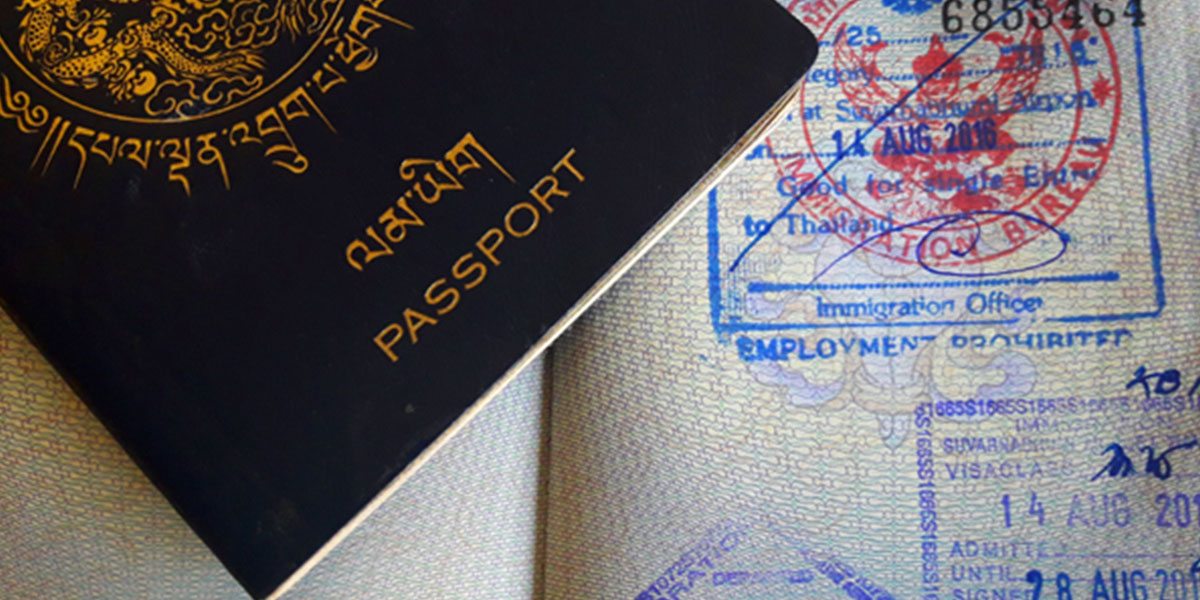
Bhutan has welcomed travelers looking for deeply immersing experiences in a natural haven since 1974, guided by the unique, environmentally friendly tourism philosophy of “High value, Low volume.” Here’s an update on all the latest Bhutan Travel Restrictions for tourists.
Bhutan will reopen to international tourists for the first time since the pandemic began more than two years ago on 23rd September 2022.
Known for its unique development philosophy of Gross National Happiness, this tiny Himalayan Kingdom is a world leader in conservation and sustainable tourism practices.
So, if you are planning a trip to the only carbon-negative country in the world, there are certain Bhutan’s travel restrictions for tourists you must know.
That’s why we at Norbu Bhutan will help you answer frequently asked questions regarding Bhutan’s travel restrictions for tourists. Discover everything there is to know about Bhutan’s travel restrictions for tourists only with Norbu Bhutan Travels!
What are Bhutan Travel Restrictions For Tourists?
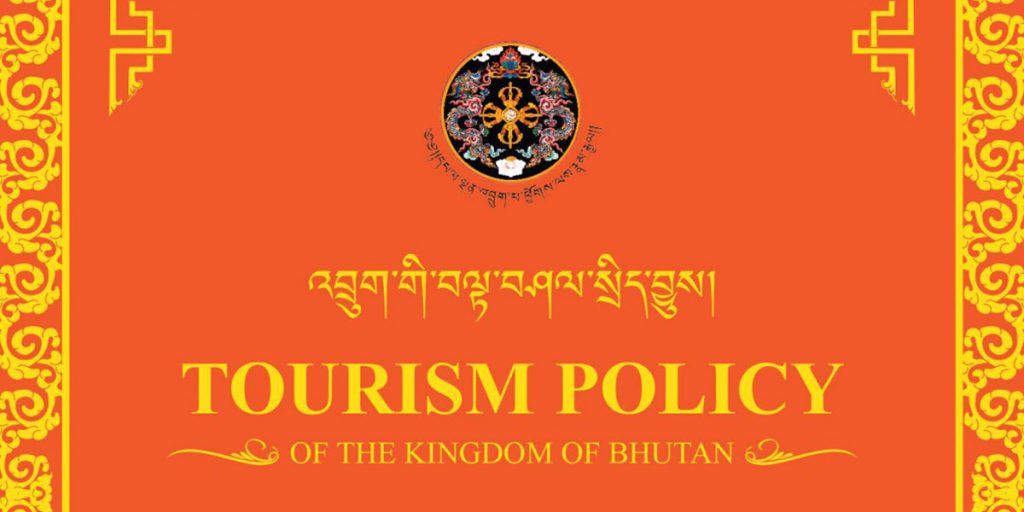
Tourists who want to visit Bhutan must follow the Bhutan travel restrictions for tourists, which include producing a COVID-19 negative certificate upon arrival. For unvaccinated travelers, you will still need to quarantine for five nights at your own expense.
All travelers to Bhutan visiting Bhutan will have to follow the following Covid-protocols set forth by the National Covid-19 Task Force (NC19TF):
- Provide a Covid-negative RT-PCR test result from a certified laboratory
- Stay in 24 hours quarantine
- Must pay for all tests as required by COVID-19
- Strictly adhere to COVID-19 Protocol
- Must have health insurance
Additionally, overseas tourists will need a Bhutan visa, whereas regional tourists will need entry permits to enter Bhutan.
Norbu Bhutan provides excellent Tour Packages to groups of all sizes! Enjoy our premium service whether you’re a solo traveler or coming with a group!
Do visitors to Bhutan have to pay a Sustainable Development Fee?
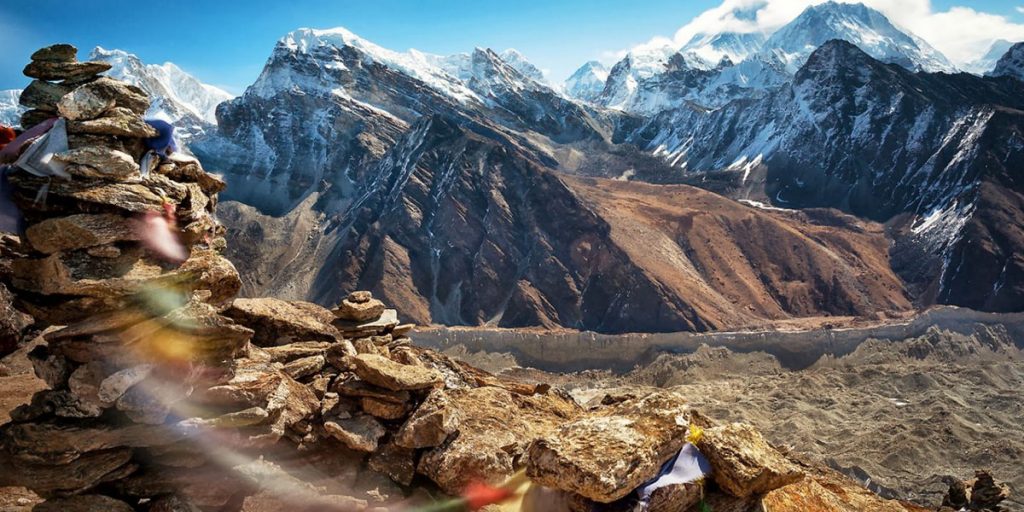
The Royal Government of Bhutan levies SDF or Sustainable Development Fees to all tourists visiting Bhutan. This is set to promote sustainable yet luxurious tourism aligned with Bhutan’s “High value, Low volume” tourism policy.
With the revised tourism levy bill, all visitors must pay a sustainable development fee of USD 200 per person per night and additional payments for your hotels, meals, transportation, and guide.
Regional visitors from Bangladesh, the Maldives, and India will have to pay an SDF fee of Rs 1200 per night, plus the cost of a guide and transportation. While children under the age of five will be exempt, those aged six to twelve will only receive a 50% concession.
Why the change in Bhutan Travel Restrictions For Tourists?
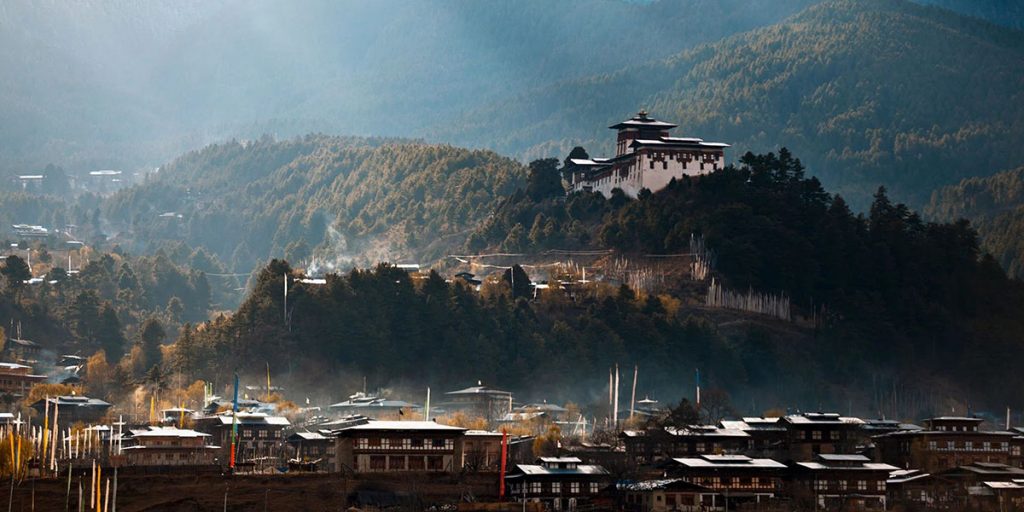
COVID-19 has allowed Bhutan to reset — considering how the sector can be best constituted and operated while keeping carbon footprints low.
Furthermore, before the Covid-19 pandemic, Bhutan received approximately 274,000 tourists, with regional tourists from India accounting for 66% of the total.
This was a significant untapped revenue source for a small country like Bhutan. It resulted in introducing the revised tourism fee for regional and overseas tourists.
Bhutan Travel Restrictions For Tourists: Restricted Area
When you arrive in Bhutan, you will be given a 7-14 day stay permit that will only allow you to travel within the Thimphu, Paro, and Southern districts. Beyond these districts, the rest of Bhutan is categorized as restricted areas.
So, if you want to explore Bhutan’s hidden gems, Norbu Bhutan can help you obtain a Restricted Area Permit from the Immigration office in the capital.
Bhutan Travel Restrictions For Tourists: Visa Requirements
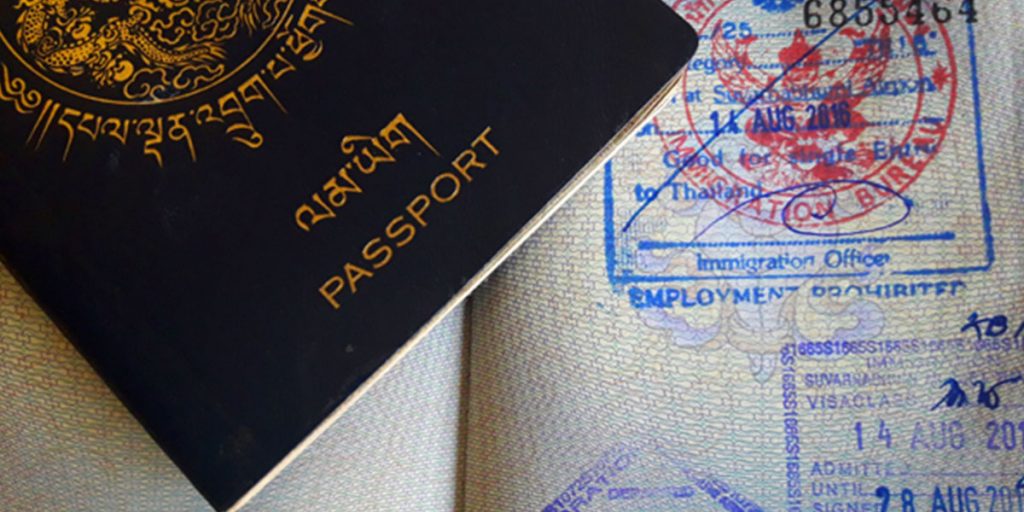
Under Bhutan’s tourism regulations overseas, visitors can apply for their tourist visas through a licensed tour operator or your hotel. Bhutan Immigration now accepts direct visa applications for tourists through the Department of Immigration.
After completing and submitting all your visa documents, you will receive a Bhutan visa confirmation from your travel operator.
Documents required for Bhutan visa:
- Scanned color copy of your passport.
- Your full name
- Email address
- Contact information
Let Norbu Bhutan help you plan your Bhutan tour, including having access to the most up-to-date Visa information for tourists, and guide your trip to the Land of Thunder Dragon without hassle or confusion!
Bhutan Travel Restrictions For Tourists: Visa Application
It will take up to 7 working days to process the tourist visa. However, the visa’s approval is contingent on your tour operator’s full payment. The Tourism Council of Bhutan (TCB) levies a one-time processing fee of USD 40 per person.
Here is a breakdown of the Bhutan Visa application process:
- Find a licensed tour operator in Bhutan. Norbu Bhutan is one of the leading tour agencies in the country with decades of experience, including streamlining visa applications for our guests.
- Discuss and confirm your travel plan, including hotel & flight reservation and itinerary confirmation.
- Finalize and agree on the tour cost.
- Traveler must wire the total amount of the tour cost and the visa processing fee to the tour operator and share a color scanned passport copy.
- The tour operator will initiate the visa application process on behalf of the traveler after receiving the visa fee payment.
- The Tourism Council of Bhutan will verify the submission of the visa application once the payment is received.
- TCB will endorse the tourist visa upon successful fee payment to the tour agency.
- A copy of the tourist visa will be shared with the traveler via email.
Bhutan Travel Restrictions For Tourists: Travel Accessibilities
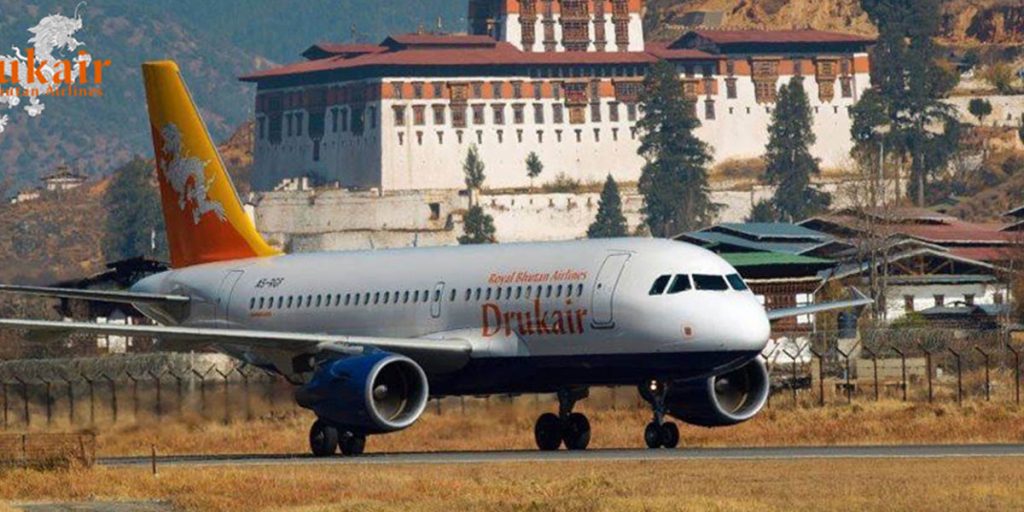
There are three ways to enter Bhutan based on your convenience, whether you are a regional or international tourist- by air, by rail, and by road.
You will have to book a flight with either Drukair or Bhutan Airlines because these are the only two airlines that fly in and out of Bhutan.
One of the most cost-effective ways to travel from India to Bhutan without a Bhutan visa for Indians is by train. The nearest railway station to Hasimara is in Jaigaon, an Indian town on the Indo-Bhutan border. Tickets and schedules are available on the IRCTC website of the Indian Railways.
Another way to travel to Bhutan without a Bhutan visa for Indians is by road via Jaigaon, West Bengal. It is only 4.3 kilometers from the border town of Phuentsholing in Bhutan.
You will need to obtain a proper Entry Permit, produce a negative Covid-19 test result, and stay in quarantine at your own expense for one day.
You can learn more about airfare accessibility to Bhutan with Norbu Bhutan.
While visiting Bhutan is certainly an adventure of the greatest value, experiencing Bhutan through tailored excursions the country offers will enrich your entire travel experience.
As Bhutan reopens its borders to tourists, with new Bhutan travel restrictions for tourists in place that are aligned with Bhutan’s GNH policy, you can now begin to plan a well-seasoned tour operator like Norbu Bhutan.
We offer several family tour packages to spend holidays in Bhutan tailored to your needs to help your stay in the last Shangriila memorable.
Stay up to date on all the latest Bhutan Travel Restrictions for tourists only with Norbu Bhutan Travels with our Important Travel Updates before booking your Bhutan trip with us!
Categories:
No responses yet
Leave a reply cancel reply.
Your email address will not be published. Required fields are marked *
Save my name, email, and website in this browser for the next time I comment.
Recent Posts
- Bhutan Travel: Capturing Bhutan Through Pictures
- Trip To Bhutan: Discover 7 Must-Visit Temples
- Travel to Bhutan: 5 Must Visit Family-Friendly Places
- Explore Best Restaurants In Thimphu’s For Finest Flavors
- Top 5 Must-Visit Destinations On Your Trip To Bhutan
- February 2023
- January 2023
- December 2022
- November 2022
- October 2022
- September 2022
- August 2022
- February 2022
- January 2022
- December 2021
- November 2021
- October 2021
- September 2021
- Best Restaurants in Bhutan
- Best Time To Visit Bhutan
- Bhutan Safari
- Bhutan Travel
- Bhutan Trip
- Bhutanese Festivals
- Bhutanese food
- Bhutanese Monasteries
- Bhutanese treks
- Biking in Bhutan
- Day in Thimphu, Bhutan
- Guide to Bhutan
- Hike Trails
- Hot-spots in Bhutan
- Hotels & Lodges in Bhutan
- News & updates
- Places to Visit
- shop in Bhutan
- The National Sport of Bhutan
- Travel Bhutan
- Uncategorized
- Wildlife Sanctuaries in Bhutan
Lost your sparkle?
Come visit our mystical landscapes.
- Travel Information
Bhutan Travel Information
Bhutan Travel Tips
Bhutan Tour Packages
Norbu Bhutan Travel pvt.ltd
Royal Textile Academy Office Suites P.O : Post Box 1213 Place: Thimphu: Bhutan Phone # +975-2-340151, 340152, 340153 FAX # +975-2-340150 Email : [email protected]
Subscribe to Quarterly Newsletter
Norbu bhutan subscription form.
Keep Yourself Up To Date!
This is a success preview text.
This is a error preview text.
WhatsApp us
Traveling in Bhutan: What You Need to Know Before You Go
:max_bytes(150000):strip_icc():format(webp)/10947453_10153084623948270_8191342691038933499_o-591d1e8d3df78cf5fa731909.jpg)
Unless you're from a select few countries, such as India, Bangladesh, and the Maldives, travel to Bhutan is expensive and not easily undertaken. However, the distinctive Buddhist culture, unspoiled scenery, and fresh mountain air make it very worthwhile. The number of people visiting Bhutan is increasing every year, reflective of growing interest in the country as a tourism destination. Here's what you need to know to plan your trip.
Tours and Independent Travel
The Bhutanese government is hesitant about allowing visitors into the country. Independent travel to Bhutan is opening up, but it's not something the government encourages. Generally, visitors to Bhutan must either be tourists or guests of the government. The only other options for visiting the country are to receive an invitation from "a citizen of some standing" or a volunteer organization.
With the exception of passport holders from India, Bangladesh, and the Maldives, all tourists must travel on a pre-planned, prepaid, guided package tour or custom-designed travel program.
Getting a Visa
Everyone traveling to Bhutan must obtain a visa in advance, except for passport holders from India, Bangladesh, and the Maldives. Passport holders from these three countries are classified as "regional tourists" and can obtain a free Entry Permit on arrival upon producing their passport with a minimum of six months validity. Indian nationals can also use their Voters Identity Card. Citizens of these countries must still pay a Sustainable Development Fee of $17 per day. An exemption applies to tourists visiting 11 specific districts in eastern Bhutan, from Trongsa to Trashigang. The Bhutanese government is aiming to increase tourism in this region.
For other passport holders, the Sustainable Development Fee is $65, which is included in the "Minimum Daily Package" rate (see below). The visa cost is $40. The visas must be applied for and paid for in advance, from registered tour operators (not embassies), at the same time as booking the rest of your trip. You should make your travel arrangements at least 90 days before travel to allow time for all the formalities to be completed.
The visas are processed through an online system by the tour operators and are approved by the Tourism Council of Bhutan once full payment of the cost of the trip has been received. Tourists are issued a visa clearance letter to be presented at immigration upon arrival at the airport. The visa is then stamped in the passport.
Getting There
The only international airport in Bhutan is located at Paro, about an hour's drive from Thimphu. Currently, two national airlines operate flights to Bhutan: Drukair and Bhutan Airlines. Departure points include Bangkok (Thailand), Kathmandu (Nepal), New Delhi and Kolkata (India), Dhaka (Bangladesh), Yangoon (Myanmar), and Singapore.
It's also possible to travel to Bhutan from India overland by road. The main border crossing is Jaigaon-Phuentsholing. There are two others, at Gelephu and Samdrup Jongkhar.
The minimum price of tours (called a "Minimum Daily Package") to Bhutan is set by the government to control tourism and protect the environment, and can't be negotiated. The price includes all accommodations, meals, transportation, guides and porters, and cultural programs. Part of it also goes towards free education, healthcare, and poverty alleviation in Bhutan.
"Minimum Daily Package" prices vary according to the season and the number of tourists in the group.
High Season: March, April, May, September, October, and November
- $250 per person per day for a group of three or more people.
- $280 per person per day for a group of two people.
- $290 per day for single individuals.
Low Season: January, February, June, July, and August
- $200 per person per day for a group of three or more people.
- $230 per person per day for a group of two people.
- $240 per day for single individuals.
Discounts are available for children and students.
Do note that each tour operator has their preferred hotels. These are often the ones that cost less. Therefore, tourists should find out the hotels they've been assigned to, do some research about hotels in Bhutan, and ask to switch hotels if they are not satisfied. Most people assume they're stuck with a fixed itinerary and the hotels allocated to them. However, tour companies will, in fact, accommodate requests in order to keep business.
Tour Companies
The Bhutan Tourist Corporation Limited (BTCL) is highly recommended for making travel bookings to Bhutan. This company is owned by members of the royal family and advertises itself as Bhutan's number one travel agency since 1991. The drivers, guides, and accommodations provided are excellent. If you're interested in photography, see what Rainbow Photography Tours of Bhutan has to offer.
The Tourism Council of Bhutan also has a list of registered tour operators on its website.
The Bhutanese currency is called Ngultrum (BTN) and its value is linked to the Indian Rupee. The Indian Rupee can be used as legal tender in Bhutan, but the Ngultrum is not legal tender in India. There are a limited number of ATMs available.
Development in Bhutan
Bhutan is rapidly changing with a great deal of construction going on, particularly in Thimphu and Paro. As a result, these places have already started to lose their charm and authenticity. Visitors are advised to fly internally from Paro to Bumthang, in the heart of Bhutan, in order to experience the traditional Bhutan. If you're thinking about visiting Bhutan, it's better to go sooner rather than later!
23 Fun Facts About Bhutan, Asia's Most Mysterious Country
Essential Guide to Hiring a Car and Driver in India
The Best Time to Visit Bhutan
What Documents Do I Need for Mexico Travel?
The Ultimate Guide to the Taj Mahal in India
Your Ultimate Trip to India: The Complete Guide
Kolkata Netaji Subhash Chandra Bose Airport Guide
15 Easy Ways to Save Money on Your India Trip
Options for Bollywood Tours in Mumbai
Driving in Paris, France
Permits for North East India and What You Need to Know
One Week in Delhi: The Perfect Itinerary
18 Farmstays in India to Get Back to Nature
Jaipur Literature Festival Essential Guide
Is Thailand Ready to Reopen Its Borders to Tourists?
Visa Requirements for India
It just got (much) cheaper to visit Bhutan – start planning that dream trip

Aug 31, 2023 • 11 min read
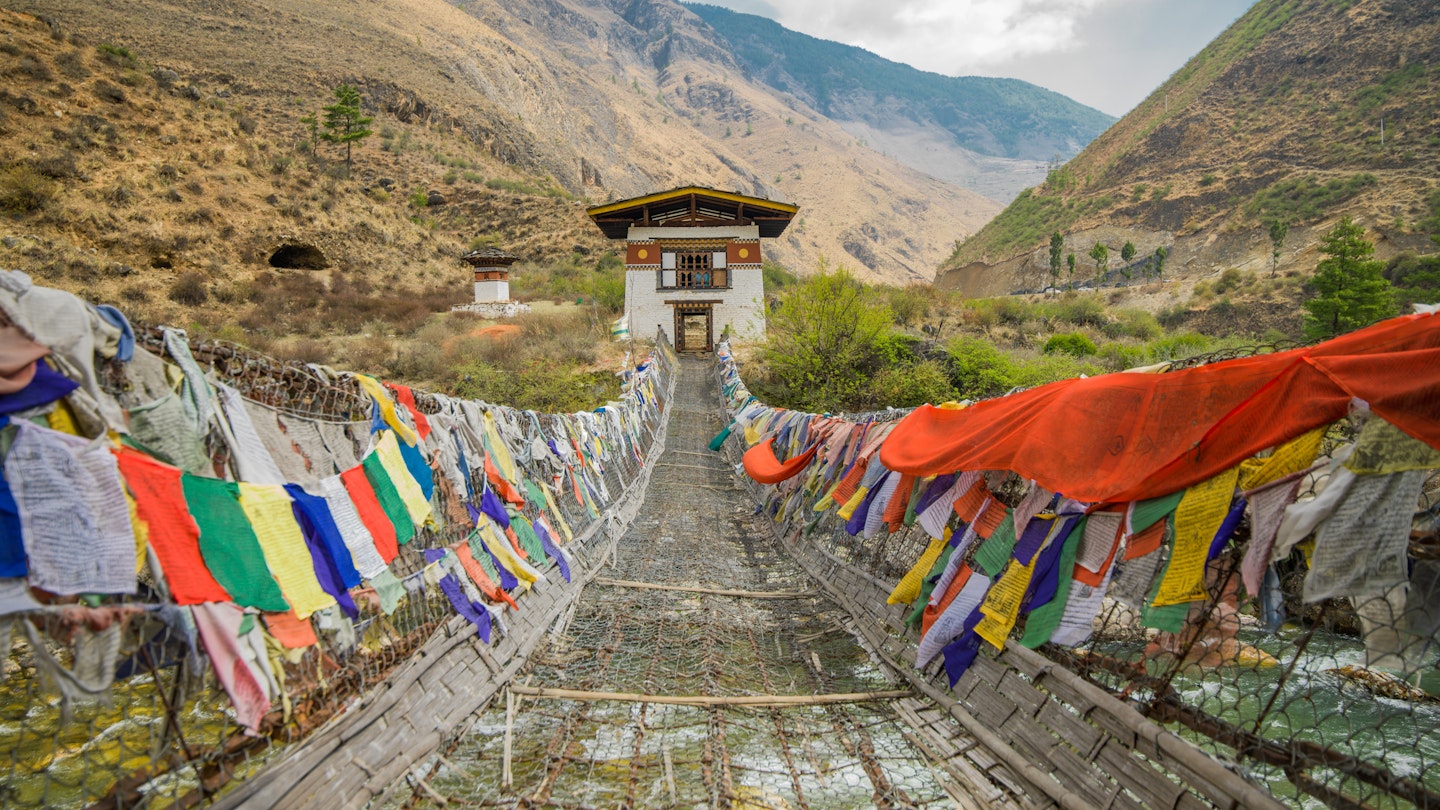
Bhutan is a destination only lightly touched by tourism © Mark Paulda/Getty Images
Since tentatively opening up to tourism in 1974, the Himalayan kingdom of Bhutan has earned a reputation as one of the most pristine – and expensive – places to visit on the planet.
Tight controls on tourism and high daily tourist fees have helped to preserve a traditional Buddhist culture that is rapidly vanishing from other parts of the Himalayas. And in 2022, those fees climbed even higher, as Bhutan opened its borders to travelers following the pandemic.
Now, almost a year after this sudden price hike, the Bhutanese government has announced another shake-up to the daily tourist fees – but this time, fees are coming down significantly. For travelers deterred from visiting Bhutan’s ancient fortress monasteries and immaculate mountain valleys by the high price tag, this is welcome news, but what exactly are the new rules, and how do they affect travelers?
If Bhutan has long been on your bucket list and you’re ready to go, here’s what you need to know about the new fees, including what you will be charged for and where the money ends up.
What was the old system for visiting Bhutan?
Until 2022, tourists to Bhutan were charged a daily tourist fee of $250 ($200 in the low season) for every day spent in the country. This might sound expensive, but the fee covered food, accommodation, transport, guide fees and most of the other essentials tourists needed for a once-in-a-lifetime trip. Also included in the daily charge was a $65 Sustainable Development Fee, funding far-reaching social programs in a nation famed for measuring progress in terms of Gross National Happiness rather than Gross National Product.
In September 2022, Bhutan reopened to un-quarantined tourists for the first time since the start of the pandemic – but the Sustainable Development Fee increased to $200 per day, with additional charges for accommodation, food, transport, entry to sights and guides. Lower fees applied for tourists from neighboring India , but for most other visitors, the cost of travel to Bhutan doubled from an already high baseline.
For some, Bhutan was no longer a once-in-a-lifetime destination tantalizingly within reach, but an unattainable dream, particularly with the soaring cost of flights and the post-COVID-19 cost-of-living crisis. For a while, it seemed that Bhutan’s unique experiences would be reserved for the high-flying elite; Himalaya fans with smaller budgets folded away their maps of alpine valleys and prayer-flag-draped monasteries and looked elsewhere for their dose of mountain magic.
In fact, the blow was soon softened by a series of discounts offered to travelers staying more than four nights in Bhutan, with additional days exempt from the daily fee once visitors reached a certain threshold. But as of September 2023, cheaper – if not exactly cheap – travel to Bhutan is back in the cards. Here are the changes, and what they mean for travelers dreaming of Bhutan's pure mountain air and timeless Buddhist architecture.
Getting the best out of your trip to Bhutan
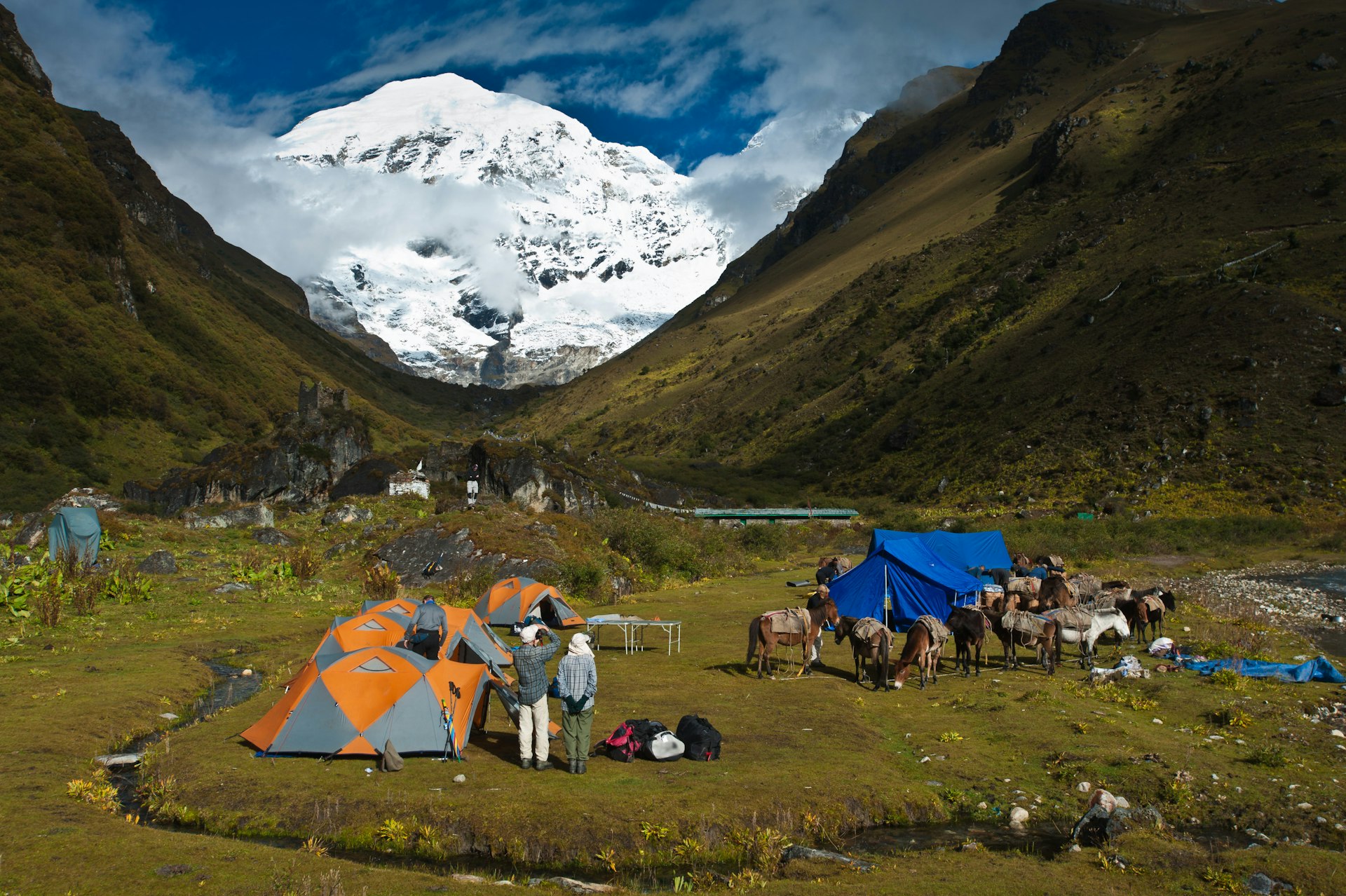
What is the new system starting in September 2023?
After increasing by 200% in 2022, the daily Sustainable Development Fee will be cut in half from September 1, 2023 to a more affordable US$100 per day. Children ages six to 12 will pay $50 per day, and there’s no fee for children age five or under. This is a significant price drop – but travelers will still have to budget for meals, transport, guide fees, entry charges at dzongs (fortress-monasteries) and museums, and hotels – which can cost anything from $40 per night for a budget hotel in the capital, Thimphu , to nearly $2000 per night for the lavish, palace-like Amankora Paro Lodge in Paro .
Then there are flights, with the trip from New York to Paro coming in at around $2000, transferring in either India or Nepal to a Bhutan-bound flight with Bhutan Airlines or Druk Air – the only airlines licensed to fly into the international airport at Paro. You should budget a minimum of $300 per day for a trip to Bhutan, and considerably more to stay in superior classes of hotel, in addition to the cost of your flights.
However, this high price tag gets you access to a destination only lightly touched by tourism. Only around 40,000 tourists visited Bhutan in the first six months after the country reopened following the pandemic, with more than half of these visitors coming from India. For comparison, Nepal received nearly 500,000 visitors over the same period, and India saw more than four million arrivals.
With the low visitor numbers, sights in Bhutan – such as the majestic dzongs in Paro, Thimphu and Punakha and the gravity-defying monastery at Taktshang – only become truly crowded when locals are gathering for one of the country’s colorful Buddhist festivals. While the influence of the modern world is creeping into Bhutan, particularly in Thimphu, your prevailing memories will be of peace, silence and clear mountain air scented by the aromatic resin of blue pines. For travelers seeking Shangri-La in real life, the experience is priceless.
Are there any changes for travelers from India, Bangladesh and Maldives?
Visitors from India, Bangladesh and Maldives are subject to different rules. Travelers from India, who make up 73% of all visitors to Bhutan, can visit with a special permit – available through the Bhutanese government’s visa portal – paying a low daily fee of ₹1200 (about $15). Bangladeshi and Maldivian citizens must apply for a visa, on top of the same special daily fee. No changes have been announced to this system.
In Bhutan, a historic Himalayan route opens to hikers for the first time in 60 years
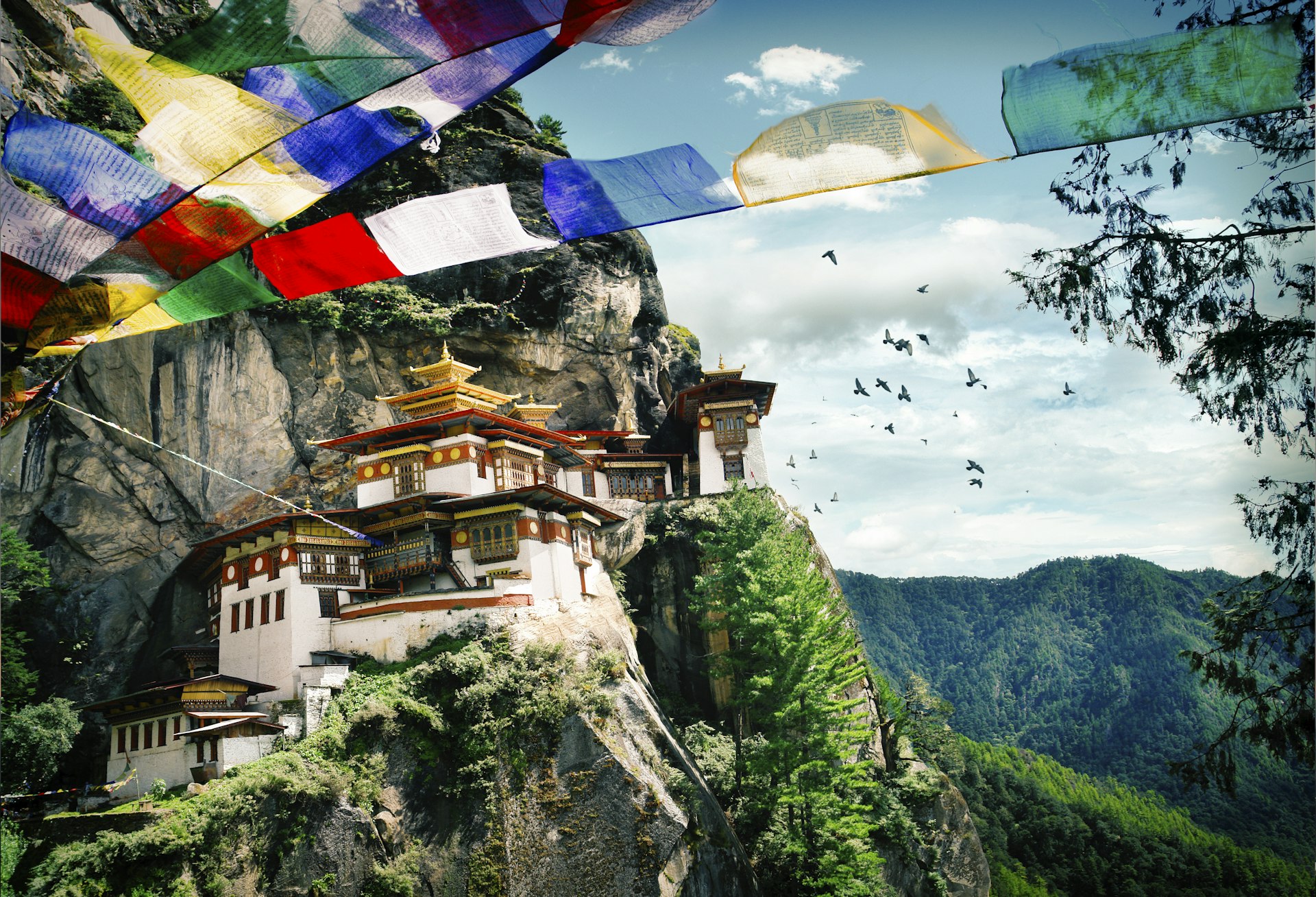
What if I want to go trekking?
With its lofty Himalayan valleys and remote monasteries, Bhutan is a spectacular trekking destination, but the daily Sustainable Development Fee still applies. The most practical way to trek is to make arrangements through a Bhutanese tour operator, who will provide guides, support staff, pack animals, tent accommodation and meals for the duration of your trek.
With a support team to transport your bags and put up your tent and a hot breakfast waiting for you when you wake up every morning, the experience is more like glamping than wild camping, and the trails are delightfully uncrowded – particularly if you attempt more ambitious routes such as the 28-day Trans-Bhutan Trail . You’ll also get to meet local people following a traditional way of life, far from the tourist bustle.
What about my visa?
Applying for a visa for Bhutan is a little different from applying for a visa for most other countries. Visas are not issued by embassies overseas but are stamped into your passport on arrival, on production of a pre-approval letter confirming you have paid the daily tourist fees and the $40 visa-processing fee. The easiest way to obtain this letter is to make arrangements through an approved Bhutanese tour operator; you can also apply online via the government's visa portal (you’ll also need mandatory travel insurance for the duration of your trip).
Be aware that you will have to pay the Sustainable Development Fee for every day of your stay at the same time as you apply for your visa. Many travelers feel more comfortable applying through a tour agency, rather than making a payment of hundreds or even thousands of dollars via an online form. Using an agency will also allow you to talk through your itinerary with an experienced local expert. It’s the best way to ensure that you get maximum value from the daily fee (for instance, you don't want to squander $100 days backtracking to places you have already visited).

Why has this decision been made now?
When the daily fee was increased in 2022, the government announced that funds raised would be used to offset the carbon footprint of tourism, reduce fossil-fuel dependency, improve carbon-neutral infrastructure and up-skill workers in Bhutan’s tourism sector, supporting Bhutan’s recovery from the pandemic.
However, in the first few months following the reopening, international visitor numbers fell markedly compared to before COVID-19, attributed to the new fee structure, worldwide inflation and economic uncertainty linked to the war in Ukraine. Nearly 60,000 people visited Bhutan from January to August 2023, compared to 315,600 travelers for the whole of 2019. The economic foundation of Bhutan’s “high value, low volume” tourism model no longer seemed quite so secure.
According to a government statement, the new fee reduction announced in 2023 reflects the “important role of the tourism sector in generating employment; earning foreign exchange; realizing the potential for spillover benefits for ancillary industries; and in boosting overall economic growth.”
Commenting on the change, Dorji Dhradhul, director general of the Department of Tourism Bhutan, said: “ Amid the global recovery from the COVID-19 pandemic, ongoing European conflicts, and economic challenges affecting key markets, we’ve attentively considered feedback from our guests, industry peers and global travel partners."
"Consequently, we’ve decided to temporarily reduce our Sustainable Development Fee (SDF) to rejuvenate our tourism industry. This will not only make our nation more accessible to potential visitors but will also ensure sustained funding for the numerous projects supported by the SDF."
It’s a valid stance for the government to take. In 2019, the Sustainable Development Fee contributed nearly $89 million to the Bhutanese economy. During the eight months from January to August 2023, the Sustainable Development Fee delivered a more modest $13.5 million into the national coffers.
Another issue was the lack of warning provided by the authorities when Bhutan reopened to tourism after the pandemic. The government announced the doubling of the daily fee just weeks before the borders opened in September 2022 – for a destination where tourists typically spend up to six months planning a trip.
The current reduction in the daily fee has also been announced on short notice, but the lower rate will apply until August 31, 2027, giving tourists some certainty when planning ahead for a trip to Bhutan.
Escaping Thimphu: where to go to find Bhutan’s hidden treasures
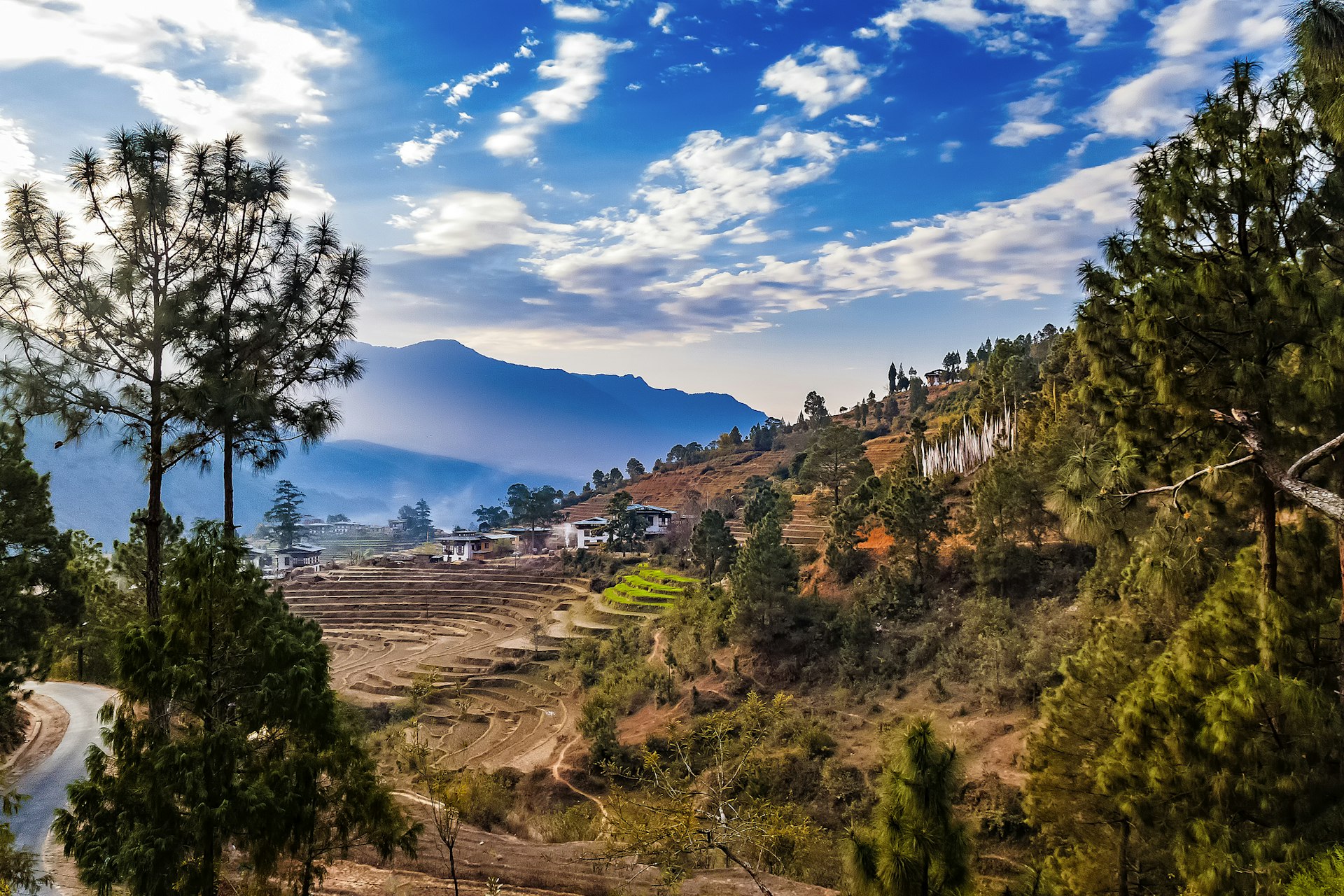
Where will my money go?
Bhutan’s unique tourism model has delivered significant benefits for the people of this remote Himalayan kingdom. On top of free healthcare and education, the Sustainable Development Fee has funded everything from conservation to carbon-neutral infrastructure and organic farming. These projects have contributed to Bhutan becoming the first carbon-negative country on earth – actually absorbing more carbon dioxide than it produces.
What does sustainable development look like on the ground? With tourism reducing the pressure on agriculture to sustain the economy, Bhutan has managed to keep 71% of its territory under forest cover, compared to just 25% in Nepal and 11% in Bangladesh . Some 95% of Bhutan’s electricity is produced using hydropower, and almost 100% of the population has access to electricity and clean water.
In exchange for opening their mountain home to high-value, low-impact tourism, the Bhutanese have achieved a high standard of living compared to their neighbors. Bhutan spends nearly 40% more than Nepal on education, with half the unemployment rate and half as many people living under the poverty line. And the adult literacy rate is growing at 10% per year – not bad for a country where 61% of people live in remote mountain villages.
Bhutan is also famous for its Gross National Happiness – an innovative model for assessing the successes and achievements of Bhutan’s part-monarchy, part-clergy and part-elected government. Using such measures as job satisfaction, sense of community, psychological well-being and religious karma, Bhutan is rated as the happiest country in the world.
Know your gompas: a Lonely Planet guide to Tibetan Buddhist monasteries
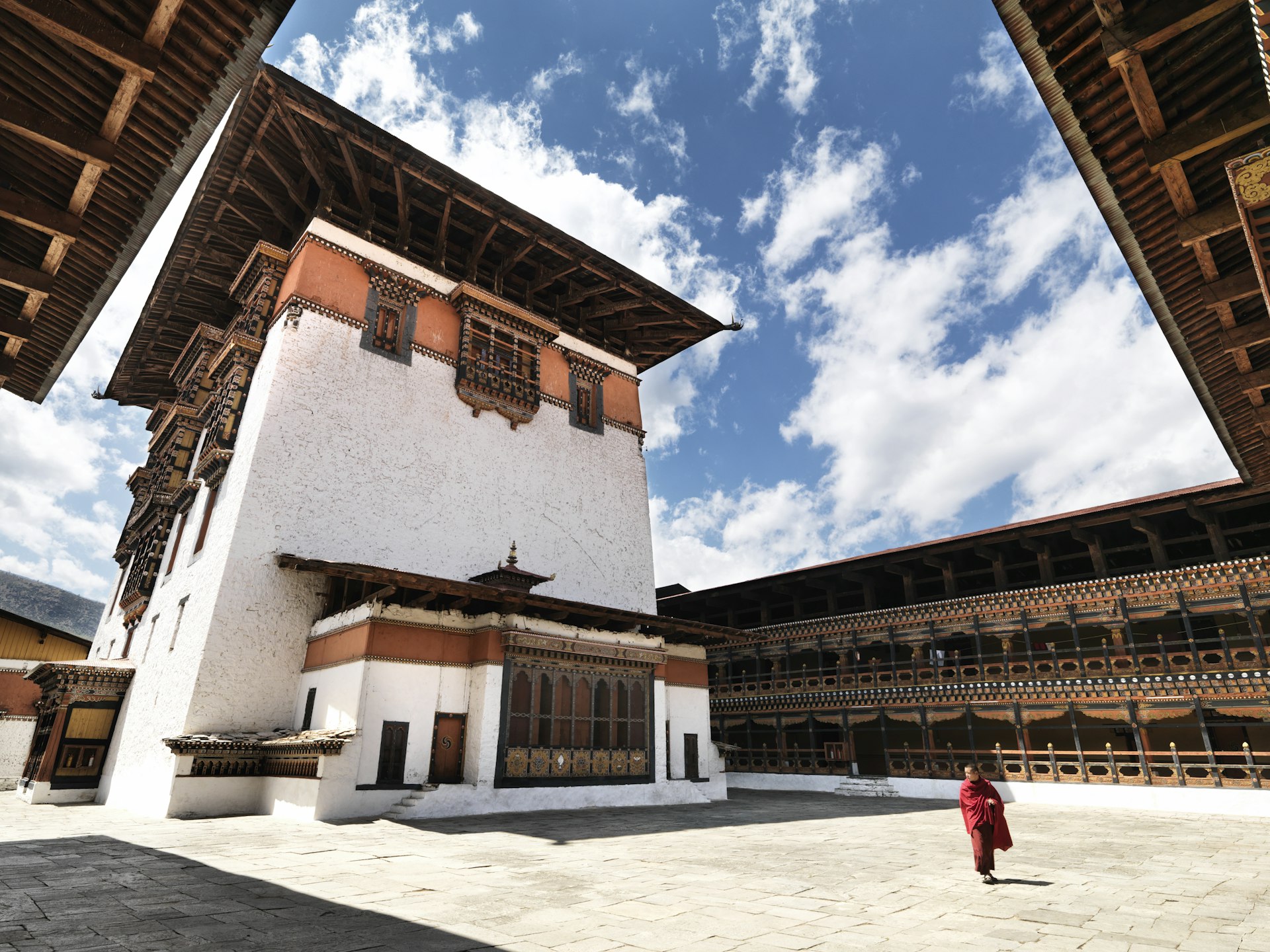
So is Bhutan still worth visiting?
Of course! While visiting Bhutan will always be an expensive option, the lower daily fee makes travel here more affordable – just not quite as affordable as it was before the pandemic. In truth, Bhutan was always a plan-ahead-and-save-up kind of destination, and with the lower Sustainable Development Fee fixed until 2027, travelers have a clear target to aim for over the next four years.
Looking at things objectively, tourist fees are increasingly the future of travel. Barcelona has had a tourist tax since 2012, Thailand imposed a $9 tourist tax in 2022, Manchester introduced a daily tourist charge in 2023, and Venice and Valencia are poised to levy new tourist charges during the 2023–24 season. The primary difference in Bhutan is that you need slightly deeper pockets.
If the lower daily fee succeeds in luring more people to Bhutan, visitor numbers will still be small by international standards, and the government will have more funds for worthy social and environmental initiatives such as new hydropower projects and the electrification of public transport. In the future, that famously clean mountain air may become even cleaner and more keenly fragranced by the scent of glacial meltwater and blue pines.
This article was first published Aug 12, 2022 and updated Aug 31, 2023.
Explore related stories
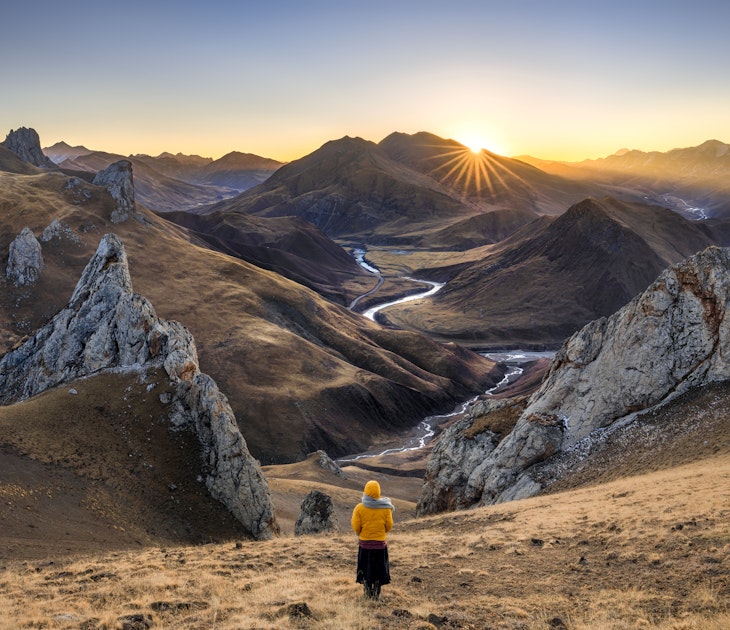
Jan 5, 2024 • 20 min read
As the new year begins, here are 24 of the world’s most life-affirming journeys to consider for nurturing your path to self-discovery.
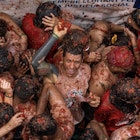
May 3, 2024 • 6 min read
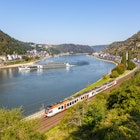
May 3, 2024 • 5 min read

Apr 25, 2024 • 5 min read
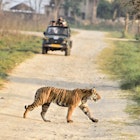
Apr 16, 2024 • 13 min read

Apr 16, 2024 • 7 min read

Apr 8, 2024 • 6 min read
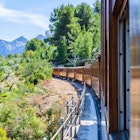
Apr 3, 2024 • 15 min read

Mar 26, 2024 • 8 min read

Mar 26, 2024 • 3 min read
- Destinations
- Hotels & Homestays
- Food & Drink
- People & Culture
- Mindful Travel
- Readers' Travel Awards
- Escape to Rajasthan
- READERS TRAVEL AWARDS
- #LOVEGREATBRITAIN
- TAJ SAFARIS
- BOUTIQUE HOTELS
- CNT TOP RESTAURANT AWARDS
- DESTINATION WEDDING GUIDE
- DON’T TRAVEL WITHOUT IT
- #UNDISCOVERAUSTRALIA
- ESSENTIALLY RAJASTHAN
Bhutan reopens: 5 things to know for travellers
By Saumya Ancheri

Starting 23 September 2022, travellers can again take in one of the world’s most beautiful descents, flying down to Paro airport in the Himalayan mountain kingdom of Bhutan . After closing borders as the world went into COVID-19 lockdown over two years ago, Bhutan is now reopening with even more on offer. The country is a magnet for its pristine nature and wildlife, rich culture and deep spirituality–not to mention restorative hot stone baths and gorgeous hotels . Earlier this year also saw the launch of the Trans Bhutan Trail , restored and reopened after 60 years; travellers can get permits to walk or go mountain biking to some of the Bhutan’s most remote locations and popular sites, on the historic 403-km route once used by armies, traders and pilgrims for thousands of years. There are a few changes to keep in mind for travellers to Bhutan this year.
Five things to know as Bhutan reopens to travellers in 2022
Covid protocol
While the Bhutan government recommends that visitors are vaccinated against COVID-19 to help curb the pandemic, there are no COVID-19 vaccination requirements for anyone to enter Bhutan. There is no quarantine period. There is a health declaration in the entry formalities. Adults and children aged 12 years and older entering Bhutan may be subjected to random RT-PCR testing at the points of entry or at a worksite to maintain COVID-19 surveillance for new variants; there will be no testing fee. Those who test positive for COVID-19 will be required to quarantine at the hotel at their own expense until they test negative. The additional PCR tests will also be paid for by the traveller, however the Sustainable Development Fee will be waived during quarantine. Bhutan does not have any COVID-19 protocol for travellers leaving the country, although it is advisable to check for any rules at the port of arrival.
There’s a Sustainable Development Fee
The SDF is the Sustainable Development Fee, a daily levy paid by visitors that, as the tourism website says, helps “ensure that tourists visit us in sustainable numbers and that we can continue to offer guests tranquillity and an intimate experience. The SDF is collected by the national exchequer and funds are allocated to various projects that enhance facilities, services and infrastructure for Bhutanese nationals and visitors, as well as funding free healthcare and education ”. Indians will need to pay 1,200 ngultrum/Rs1,200 daily, while other foreign nationals will pay US$200 per person per night. Children aged six to 12 at the time of travel receive a 50% concession; those aged five or younger are exempt. Day visitors to the Bhutanese towns bordering India (in Assam, Arunachal Pradesh, West Bengal and Sikkim) are exempt from paying the SDF up to a point that is designated by the Bhutanese government. The SDF for cancelled or shortened trips will be refunded after the traveller leaves the country, following their refund application on the visa portal .
Visa and entry permits for Indians
Indian passport-holders don’t need a visa but they do need a permit to enter Bhutan. While the permit can be obtained on arrival, it is recommended to apply for the permit online before departure. You will need a digital copy of your passport or Voter ID if applying online (or the hard copy if applying in person). The passport needs to be valid for six months from the intended date of departure from Bhutan. Those aged under 18 can use a birth certificate or passport to apply and must be accompanied by a legal guardian. Valid travel insurance is necessary for the duration of the visit.
Travel to, and around, Bhutan
Direct flights on Bhutan’s two national airlines, Drukair and Bhutan Airlines, operate between Paro and the Indian airports at Bagdogra, Guwahati, Kolkata and New Delhi. Travellers entering from India by road have four official checkpoints: Samtse, Phuentsholing, Gelephu and Samdrup Jongkhar. Remember that it is not possible to hire a self-drive vehicle in Bhutan. You can hire a vehicle and driver from a car rental or a tourism service provider. While your hotel can make the arrangements, you can also book a local driver, transport service provider, as well as hotels and tour operators on the Druk Ride app . Alongside Paro International Airport, there are three domestic airports, though departures can be unreliable due to the high-altitude mountain conditions. You can also privately hire the Royal Bhutan Helicopter Services .
Bhutan accepts multiple currencies
The Bhutanese ngultrum is equivalent in value to the Indian rupee, which can be used (although it might be more convenient to use smaller denominations than the Rs2,000 note). Cash in US dollars is also widely accepted. Carry some cash in either currency or in ngultrum; you can exchange foreign currency for ngultrum at Paro airport or at banks, larger hotels and authorised currency exchange businesses in Thimphu. International credit cards are widely used in urban areas of Bhutan. ATM and banks accept Visa and Mastercard. The Bank of Bhutan has a digital wallet app called goBoB that can be used with a local SIM card, and is widely accepted across the country. For more details, from local customs to ensuring any artefacts you acquire are legal to take out of the country, check the tourism website .
Update April 12, 2024
Information for u.s. citizens in the middle east.
- Travel Advisories |
- Contact Us |
- MyTravelGov |
Find U.S. Embassies & Consulates
Travel.state.gov, congressional liaison, special issuance agency, u.s. passports, international travel, intercountry adoption, international parental child abduction, records and authentications, popular links, travel advisories, mytravelgov, stay connected, legal resources, legal information, info for u.s. law enforcement, replace or certify documents.
Share this page:
Bhutan Travel Advisory
Travel advisory june 23, 2023, bhutan - level 1: exercise normal precautions.
Reissued with updates to health information.
Exercise normal precautions in Bhutan.
Read the country information page for additional information on travel to Bhutan.
If you decide to travel to Bhutan:
- Enroll in the Smart Traveler Enrollment Program ( STEP ) to receive Alerts and make it easier to locate you in an emergency.
- Follow the Department of State on Facebook and Twitter .
- Review the Country Security Report for Bhutan.
- Visit the CDC page for the latest Travel Health Information related to your travel.
- Prepare a contingency plan for emergency situations. Review the Traveler’s Checklist .
Travel Advisory Levels
Assistance for u.s. citizens, search for travel advisories, external link.
You are about to leave travel.state.gov for an external website that is not maintained by the U.S. Department of State.
Links to external websites are provided as a convenience and should not be construed as an endorsement by the U.S. Department of State of the views or products contained therein. If you wish to remain on travel.state.gov, click the "cancel" message.
You are about to visit:
- Skip to main content
- Skip to "About this site"
Language selection
Search travel.gc.ca.
Help us to improve our website. Take our survey !
COVID-19: travel health notice for all travellers
Bhutan travel advice
Latest updates: Health – editorial update
Last updated: March 13, 2024 14:26 ET
On this page
Safety and security, entry and exit requirements, laws and culture, natural disasters and climate, bhutan - take normal security precautions.
Take normal security precautions in Bhutan
Back to top
Petty crime, such as pickpocketing, theft and purse snatching, occurs on occasion, particularly in the capital Thimphu.
Ensure that your personal belongings, including your passport, are secure at all times.
Violent crime is not common.
Bhutan is located in the eastern Himalayas. Several trekking trails are situated at altitudes exceeding 5,000 metres. Acute altitude sickness may occur at high altitudes.
If you intend on trekking:
- know the symptoms of acute altitude sickness, which can be fatal
- never do so alone and always hire an experienced guide from a reputable company
- buy travel insurance that includes helicopter rescue and medical evacuation
- ensure that your physical condition is good enough to meet the challenges of your activity
- ensure that you are properly equipped and well informed about weather and other conditions that may pose a hazard
- inform a family member or friend of your itinerary, including when you expect to be back to camp
- obtain detailed information on trekking routes before setting out and do not venture off marked trails or slopes
You must buy a travel package from an authorized travel agent in advance. Travel agents and tour operators will arrange your visit and apply for your visa. A daily rate covers most services in the package, including accommodation, meals, internal transportation (except flights), guides and cultural programs. You must travel in groups with authorized drivers when visiting Bhutan.
Tourist facilities are very limited.
You may find it difficult to travel in Bhutan if you have physical disabilities.
Road safety
Road conditions and road safety can vary greatly throughout the country. The road network is extremely limited.
The main highway (referred to as the Lateral Road) is paved and connects the east and west, linking main cities. It runs from Phuentsholing on the border with India in the southwest to Trashigang in the east. Construction is currently underway on the eastern portion of the Lateral Road. Expect closures along this section of the highway.
In the mountains, sharp curves, limited visibility and narrow roads create dangerous road conditions, particularly in the winter and during the rainy season.
Because of driving and road conditions, traffic moves slowly. You may need several hours to reach your destination.
Plan your travel accordingly.
Public transportation
Public transportation in Bhutan is limited. It’s preferable to travel with the transportation arranged by your tour operator.
Taxis are available in the major cities; however, they are unreliable and poorly maintained. Drivers tend to hike up the fares as they are unregulated and often not metered.
Negotiate your fare with the driver at the start of the trip.
Stray dogs can be loud and disruptive at night and can carry rabies. Always be cautious around wandering dogs. If you are bit, head to the nearest hospital to receive an anti-rabies treatment.
We do not make assessments on the compliance of foreign domestic airlines with international safety standards.
Information about foreign domestic airlines
Every country or territory decides who can enter or exit through its borders. The Government of Canada cannot intervene on your behalf if you do not meet your destination’s entry or exit requirements.
We have obtained the information on this page from the Bhutanese authorities. It can, however, change at any time.
Verify this information with the Foreign Representatives in Canada .
Entry requirements vary depending on the type of passport you use for travel.
Before you travel, check with your transportation company about passport requirements. Its rules on passport validity may be more stringent than the country’s entry rules.
Regular Canadian passport
Your passport must be valid for at least 6 months beyond the date you expect to leave Bhutan.
Passport for official travel
Different entry rules may apply.
Official travel
Passport with “X” gender identifier
While the Government of Canada issues passports with an “X” gender identifier, it cannot guarantee your entry or transit through other countries. You might face entry restrictions in countries that do not recognize the “X” gender identifier. Before you leave, check with the closest foreign representative for your destination.
Other travel documents
Different entry rules may apply when travelling with a temporary passport or an emergency travel document. Before you leave, check with the closest foreign representative for your destination.
Useful links
- Foreign Representatives in Canada
- Canadian passports
Tourist visa: required Business visa: required
You must buy a travel package from an authorized travel agent in advance to get your visa.
Special permits
You must also obtain a special permit from the Bhutanese Ministry of Home and Cultural Affairs to travel outside of Thimphu and Paro.
- More information on applying for a visa - Tourism Council of Bhutan
- Visa requirements – Department of Immigration, Royal Government of Bhutan
Entry/exit points
There are two ways to enter Bhutan:
By road through:
- Phuentsholing, on the southwest border with West Bengal, India
- Samdrup Jongkhar, on Bhutan’s southeast border with Assam, India
- Gelephu, on the southern border with Assam, India
By air on Drukair or Bhutan Airlines
The border with China is closed.
Yellow fever
Learn about potential entry requirements related to yellow fever (vaccines section).
Children and travel
Learn more about travelling with children .
Relevant Travel Health Notices
- Global Measles Notice - 13 March, 2024
- COVID-19 and International Travel - 13 March, 2024
This section contains information on possible health risks and restrictions regularly found or ongoing in the destination. Follow this advice to lower your risk of becoming ill while travelling. Not all risks are listed below.
Consult a health care professional or visit a travel health clinic preferably 6 weeks before you travel to get personalized health advice and recommendations.
Routine vaccines
Be sure that your routine vaccinations , as per your province or territory , are up-to-date before travelling, regardless of your destination.
Some of these vaccinations include measles-mumps-rubella (MMR), diphtheria, tetanus, pertussis, polio, varicella (chickenpox), influenza and others.
Pre-travel vaccines and medications
You may be at risk for preventable diseases while travelling in this destination. Talk to a travel health professional about which medications or vaccines may be right for you, based on your destination and itinerary.
Yellow fever is a disease caused by a flavivirus from the bite of an infected mosquito.
Travellers get vaccinated either because it is required to enter a country or because it is recommended for their protection.
- There is no risk of yellow fever in this country.
Country Entry Requirement*
- Proof of vaccination is not required to enter this country.
Recommendation
- Vaccination is not recommended.
* It is important to note that country entry requirements may not reflect your risk of yellow fever at your destination. It is recommended that you contact the nearest diplomatic or consular office of the destination(s) you will be visiting to verify any additional entry requirements.
About Yellow Fever
Yellow Fever Vaccination Centres in Canada
There is a risk of hepatitis A in this destination. It is a disease of the liver. People can get hepatitis A if they ingest contaminated food or water, eat foods prepared by an infectious person, or if they have close physical contact (such as oral-anal sex) with an infectious person, although casual contact among people does not spread the virus.
Practise safe food and water precautions and wash your hands often. Vaccination is recommended for all travellers to areas where hepatitis A is present.
Hepatitis B is a risk in every destination. It is a viral liver disease that is easily transmitted from one person to another through exposure to blood and body fluids containing the hepatitis B virus. Travellers who may be exposed to blood or other bodily fluids (e.g., through sexual contact, medical treatment, sharing needles, tattooing, acupuncture or occupational exposure) are at higher risk of getting hepatitis B.
Hepatitis B vaccination is recommended for all travellers. Prevent hepatitis B infection by practicing safe sex, only using new and sterile drug equipment, and only getting tattoos and piercings in settings that follow public health regulations and standards.
Measles is a highly contagious viral disease. It can spread quickly from person to person by direct contact and through droplets in the air.
Anyone who is not protected against measles is at risk of being infected with it when travelling internationally.
Regardless of where you are going, talk to a health care professional before travelling to make sure you are fully protected against measles.
Japanese encephalitis is a viral infection that can cause swelling of the brain. It is spread to humans through the bite of an infected mosquito. Risk is very low for most travellers. Travellers at relatively higher risk may want to consider vaccination for JE prior to travelling.
Travellers are at higher risk if they will be:
- travelling long term (e.g. more than 30 days)
- making multiple trips to endemic areas
- staying for extended periods in rural areas
- visiting an area suffering a JE outbreak
- engaging in activities involving high contact with mosquitos (e.g., entomologists)
Coronavirus disease (COVID-19) is an infectious viral disease. It can spread from person to person by direct contact and through droplets in the air.
It is recommended that all eligible travellers complete a COVID-19 vaccine series along with any additional recommended doses in Canada before travelling. Evidence shows that vaccines are very effective at preventing severe illness, hospitalization and death from COVID-19. While vaccination provides better protection against serious illness, you may still be at risk of infection from the virus that causes COVID-19. Anyone who has not completed a vaccine series is at increased risk of being infected with the virus that causes COVID-19 and is at greater risk for severe disease when travelling internationally.
Before travelling, verify your destination’s COVID-19 vaccination entry/exit requirements. Regardless of where you are going, talk to a health care professional before travelling to make sure you are adequately protected against COVID-19.
The best way to protect yourself from seasonal influenza (flu) is to get vaccinated every year. Get the flu shot at least 2 weeks before travelling.
The flu occurs worldwide.
- In the Northern Hemisphere, the flu season usually runs from November to April.
- In the Southern Hemisphere, the flu season usually runs between April and October.
- In the tropics, there is flu activity year round.
The flu vaccine available in one hemisphere may only offer partial protection against the flu in the other hemisphere.
The flu virus spreads from person to person when they cough or sneeze or by touching objects and surfaces that have been contaminated with the virus. Clean your hands often and wear a mask if you have a fever or respiratory symptoms.
Typhoid is a bacterial infection spread by contaminated food or water. Travellers going to countries in South Asia should speak to a health care professional about getting vaccinated.
In this destination, rabies is carried by dogs and some wildlife, including bats. Rabies is a deadly disease that spreads to humans primarily through bites or scratches from an infected animal. While travelling, take precautions , including keeping your distance from animals (including free-roaming dogs), and closely supervising children.
If you are bitten or scratched by an animal while travelling, immediately wash the wound with soap and clean water and see a health care professional. Rabies treatment is often available in this destination.
Before travel, discuss rabies vaccination with a health care professional. It may be recommended for travellers who are at high risk of exposure (e.g., occupational risk such as veterinarians and wildlife workers, children, adventure travellers and spelunkers, and others in close contact with animals).
Malaria is a serious and sometimes fatal disease that is caused by parasites spread through the bites of mosquitoes. Limited malaria transmission may occur in this destination, but risk to travellers is very low. Antimalarial medication is not recommended for most travellers. Consult a health care professional or visit a travel health clinic before travelling to discuss your options. It is recommended to do this 6 weeks before travel, however, it is still a good idea any time before leaving. Protect yourself from mosquito bites at all times:
- Cover your skin and use an approved insect repellent on uncovered skin.
- Exclude mosquitoes from your living area with screening and/or closed, well-sealed doors and windows.
- Use insecticide-treated bed nets if mosquitoes cannot be excluded from your living area.
- Wear permethrin-treated clothing.
If you develop symptoms similar to malaria when you are travelling or up to a year after you return home, see a health care professional immediately. Tell them where you have been travelling or living.
Safe food and water precautions
Many illnesses can be caused by eating food or drinking beverages contaminated by bacteria, parasites, toxins, or viruses, or by swimming or bathing in contaminated water.
- Learn more about food and water precautions to take to avoid getting sick by visiting our eat and drink safely abroad page. Remember: Boil it, cook it, peel it, or leave it!
- Avoid getting water into your eyes, mouth or nose when swimming or participating in activities in freshwater (streams, canals, lakes), particularly after flooding or heavy rain. Water may look clean but could still be polluted or contaminated.
- Avoid inhaling or swallowing water while bathing, showering, or swimming in pools or hot tubs.
Travellers' diarrhea is the most common illness affecting travellers. It is spread from eating or drinking contaminated food or water.
Risk of developing travellers' diarrhea increases when travelling in regions with poor standards of hygiene and sanitation. Practise safe food and water precautions.
The most important treatment for travellers' diarrhea is rehydration (drinking lots of fluids). Carry oral rehydration salts when travelling.
Typhoid is a bacterial infection spread by contaminated food or water. Risk is higher among children, travellers going to rural areas, travellers visiting friends and relatives or those travelling for a long period of time.
Travellers visiting regions with a risk of typhoid, especially those exposed to places with poor sanitation, should speak to a health care professional about vaccination.
Insect bite prevention
Many diseases are spread by the bites of infected insects such as mosquitoes, ticks, fleas or flies. When travelling to areas where infected insects may be present:
- Use insect repellent (bug spray) on exposed skin
- Cover up with light-coloured, loose clothes made of tightly woven materials such as nylon or polyester
- Minimize exposure to insects
- Use mosquito netting when sleeping outdoors or in buildings that are not fully enclosed
To learn more about how you can reduce your risk of infection and disease caused by bites, both at home and abroad, visit our insect bite prevention page.
Find out what types of insects are present where you’re travelling, when they’re most active, and the symptoms of the diseases they spread.
There is a risk of chikungunya in this country. The risk may vary between regions of a country. Chikungunya is a virus spread through the bite of an infected mosquito. Chikungunya can cause a viral disease that typically causes fever and pain in the joints. In some cases, the joint pain can be severe and last for months or years.
Protect yourself from mosquito bites at all times. There is no vaccine available for chikungunya.
- In this country, dengue is a risk to travellers. It is a viral disease spread to humans by mosquito bites.
- Dengue can cause flu-like symptoms. In some cases, it can lead to severe dengue, which can be fatal.
- The level of risk of dengue changes seasonally, and varies from year to year. The level of risk also varies between regions in a country and can depend on the elevation in the region.
- Mosquitoes carrying dengue typically bite during the daytime, particularly around sunrise and sunset.
- Protect yourself from mosquito bites . There is no vaccine or medication that protects against dengue.
Animal precautions
Some infections, such as rabies and influenza, can be shared between humans and animals. Certain types of activities may increase your chance of contact with animals, such as travelling in rural or forested areas, camping, hiking, and visiting wet markets (places where live animals are slaughtered and sold) or caves.
Travellers are cautioned to avoid contact with animals, including dogs, livestock (pigs, cows), monkeys, snakes, rodents, birds, and bats, and to avoid eating undercooked wild game.
Closely supervise children, as they are more likely to come in contact with animals.
Person-to-person infections
Stay home if you’re sick and practise proper cough and sneeze etiquette , which includes coughing or sneezing into a tissue or the bend of your arm, not your hand. Reduce your risk of colds, the flu and other illnesses by:
- washing your hands often
- avoiding or limiting the amount of time spent in closed spaces, crowded places, or at large-scale events (concerts, sporting events, rallies)
- avoiding close physical contact with people who may be showing symptoms of illness
Sexually transmitted infections (STIs) , HIV , and mpox are spread through blood and bodily fluids; use condoms, practise safe sex, and limit your number of sexual partners. Check with your local public health authority pre-travel to determine your eligibility for mpox vaccine.
Tuberculosis is an infection caused by bacteria and usually affects the lungs.
For most travellers the risk of tuberculosis is low.
Travellers who may be at high risk while travelling in regions with risk of tuberculosis should discuss pre- and post-travel options with a health care professional.
High-risk travellers include those visiting or working in prisons, refugee camps, homeless shelters, or hospitals, or travellers visiting friends and relatives.
Medical services and facilities
Basic health care is available in Thimphu and Paro. Quality of care varies greatly throughout the country. The best option for urgent medical care is the Jigme Dorji Wangchuck National Referral Hospital in Thimphu.
You will likely need medical evacuation in case of serious illness or injury.
Make sure you get travel insurance that includes coverage for medical evacuation and hospital stays.
Travel health and safety
Keep in Mind...
The decision to travel is the sole responsibility of the traveller. The traveller is also responsible for his or her own personal safety.
Be prepared. Do not expect medical services to be the same as in Canada. Pack a travel health kit , especially if you will be travelling away from major city centres.
You must abide by local laws.
Learn about what you should do and how we can help if you are arrested or detained abroad .
Authorities carefully regulate tourism. You cannot travel independently. You must pre-arrange travel through an authorized travel agency.
Tourism Council of Bhutan
Penalties for possession, use or trafficking of illegal drugs are severe. Convicted offenders can expect jail sentences and heavy fines.
Drugs, alcohol and travel
Buying or selling tobacco in Bhutan is illegal. Smoking is prohibited in public places.
Imported tobacco products for personal use are subject to a 200% tax. Keep your customs receipt. You could be charged with smuggling and face imprisonment if you cannot produce it for police.
Electronic devices
Upon arrival, you must register the following electronic devises with Bhutan’s Department of Revenue and Customs:
- personal computers
- cellular telephones
- any other electronic device
Authorities will also check the items when you leave the country.
Export of all antiques is strictly prohibited. Authorities strictly reinforce the law. Authorities closely monitor and strictly enforce regulations.

Photography
Photography and filming are not permitted in some areas.
Ask your guide before taking pictures or filming inside dzongs, temples, monasteries and other religious institutions.
Dress and behaviour
To avoid offending local sensitivities:
- dress conservatively, especially in religious institutions
- behave discreetly
- respect religious and social traditions
2SLGBTQI+ travellers
While sexual acts between individuals of the same sex were decriminalized in early 2021, Bhutan does not legally recognize same-sex unions.
2SLGBTQI+ travellers could be discriminated against based on their sexual orientation, gender identity, gender expression, or sex characteristics.
Travel and your sexual orientation, gender identity, gender expression and sex characteristics
Dual citizenship
Dual citizenship is not legally recognized in Bhutan.
If local authorities consider you a citizen of Bhutan, they may refuse to grant you access to Canadian consular services. This will prevent us from providing you with those services.
Travellers with dual citizenship
International Child Abduction
The Hague Convention on the Civil Aspects of International Child Abduction is an international treaty. It can help parents with the return of children who have been removed to or retained in certain countries in violation of custody rights. It does not apply between Canada and Bhutan.
If your child was wrongfully taken to, or is being held in Bhutan by an abducting parent:
- act as quickly as you can
- consult a lawyer in Canada and in Bhutan to explore all the legal options for the return of your child
- report the situation to the nearest Canadian government office abroad or to the Vulnerable Children’s Consular Unit at Global Affairs Canada by calling the Emergency Watch and Response Centre.
If your child was removed from a country other than Canada, consult a lawyer to determine if The Hague Convention applies.
Be aware that Canadian consular officials cannot interfere in private legal matters or in another country’s judicial affairs.
- International Child Abduction: A Guidebook for Left-Behind Parents
- Travelling with children
- Canadian embassies and consulates by destination
- Emergency Watch and Response Centre
Traffic drives on the left.
It is uncommon for tourists to drive in Bhutan as transportation is offered by the tour operator.
The currency of Bhutan is the ngultrum (BTN). The Indian rupee is also accepted.
Seismic activity
Bhutan is located in an active seismic zone. Earthquakes can happen at any time.
Earthquakes - What to Do?
The rainy (or monsoon) season extends from June to September. Landslides occur frequently. Mountain roads can be hazardous, even in good weather.
Seasonal flooding can make overland travel difficult and reduce the provision of essential services. Roads may become impassable and bridges can be damaged.
- Keep informed of regional weather forecasts
- Plan accordingly
Tornadoes, cyclones, hurricanes, typhoons and monsoons
In mountainous regions, avalanches present a risk and may result in fatalities.
- Monitor local media and weather forecasts
- Follow the instructions of local authorities
Local services
In case of emergency, dial:
- Ambulance: 112
- Police: 113
- Fire services: 110
- Traffic police: 111
Consular assistance
There is no Canadian government office in Bhutan. The High Commission of Canada to India has consular responsibility for Bhutan.
Andaman and Nicobar Islands, Andhra Pradesh, Arunachal Pradesh, Assam, Bihar, Chandigarh, Chhattisgarh, Dadra and Nagar Haveli, Daman and Diu, Delhi, Goa, Gujarat, Haryana, Himachal Pradesh, Jammu and Kashmir, Jharkhand, Karnataka, Kerala, Ladakh, Lakshadweep, Madhya Pradesh, Maharashtra, Manipur, Meghalaya, Mizoram, Nagaland, Odisha, Pondicherry, Punjab, Rajasthan, Sikkim, Tamil Nadu, Telangana, Tripura, Uttar Pradesh, and Uttarakhand.
For emergency consular assistance, call the High Commission of Canada to India, in New Delhi, and follow the instructions. At any time, you may also contact the Emergency Watch and Response Centre in Ottawa.
The decision to travel is your choice and you are responsible for your personal safety abroad. We take the safety and security of Canadians abroad very seriously and provide credible and timely information in our Travel Advice to enable you to make well-informed decisions regarding your travel abroad.
The content on this page is provided for information only. While we make every effort to give you correct information, it is provided on an "as is" basis without warranty of any kind, expressed or implied. The Government of Canada does not assume responsibility and will not be liable for any damages in connection to the information provided.
If you need consular assistance while abroad, we will make every effort to help you. However, there may be constraints that will limit the ability of the Government of Canada to provide services.
Learn more about consular services .
Risk Levels
take normal security precautions.
Take similar precautions to those you would take in Canada.
Exercise a high degree of caution
There are certain safety and security concerns or the situation could change quickly. Be very cautious at all times, monitor local media and follow the instructions of local authorities.
IMPORTANT: The two levels below are official Government of Canada Travel Advisories and are issued when the safety and security of Canadians travelling or living in the country or region may be at risk.
Avoid non-essential travel
Your safety and security could be at risk. You should think about your need to travel to this country, territory or region based on family or business requirements, knowledge of or familiarity with the region, and other factors. If you are already there, think about whether you really need to be there. If you do not need to be there, you should think about leaving.
Avoid all travel
You should not travel to this country, territory or region. Your personal safety and security are at great risk. If you are already there, you should think about leaving if it is safe to do so.
Bhutan announces new tourism incentives - click here to read more
Travel Trade
Last updated: April 24, 2024
Tourism systems
Tax exemption and monitoring (idec) system, guide management system (gms), domestic tourist registration system, monument site and hotel management system, certified homestays, certified tour operators, certified tour guides, certified hotels in bhutan, festival dates, official announcements.
To read our latest announcements, please visit our announcements page here .
Helpful Resources
Policy and legislation, tourism levy act of bhutan 2022, rules and regulations, tourism rules and regulations of bhutan 2022, guidelines for establishment of homestay, guidelines of tented accommodations, procedure for assessment and registration of tourist standard restaurants, procedures for assessment and classification of tourist standard hotels, guidelines for hotel drawing, checklist to become a tour guide, guideline for tourism product development, operation and monitoring commercial rafting 2019, guideline for development of roadside amenities, guideline for domestic tourism 2020, checklist for construction drawings of tourist standard tented accommodation, guideline for operations of druk neykor, guidelines for tours/treks for expatriates and their dependents based in bhutan 2021, sop for management of sustainable development fee (sdf) waiver for upto 24 hours for tourists visiting the border towns of samtse, phuentsholing, gelephu and samdrupjongkhar, sop for dealing with the death of tourist, notifications, notification on historic monument entry fees, notification on the preferential sustainable development fee, notification regarding drones, contact details, contact details of gups, contact details of dzongdas, thrompons,planning officers and cultural officers, reports and publications, annual reports, bhutan tourism monitor 2014, bhutan tourism monitor 2015, bhutan tourism monitor 2016, bhutan tourism monitor 2017, bhutan tourism monitor 2018, bhutan tourism monitor 2019, bhutan tourism monitor 2020, tcb annual report 2020 - 2021, other reports and publications, restroom operation and management report, culture tour guide curriculum, tourism survey and research report 2019, tourism survey and research report 2020/21, domestic and outbound tourism survey (2019), post covid-19 travel behaviour study (2021), tourism establishment census of bhutan (2021), assessment of tourism carrying capacity (2021), bhutan tourism satellite account, feasibility study to promote birding tourism in samdrup jongkhar, disaster management and contingency plan for the tourism sector, forms and applications, accommodations, application form for technical clearance, application form for registration of homestays, home-stay training form, application procedures and forms for the registration of tented accommodation, evaluation form for assessment of hotel (3 star and above), tour guides, tour guide license renewal form, new guide registration form, tour operators, tour operator registration form, tour operator license clearance form, tour operator proprietor card availing form, restaurants, procedure and assessment form for tourist standard hotels, procedure and checklist for tourist standard restaurant, mice, fam and press trip applications, fam trip sop, press trip sop, sop to process fam visa for tour operators, mice sdf waiver instructions and sop, service delivery standard, issue recommendation for import license for import of hotel equipment for hotels, issue recommendation for work permits for foreign workers in accommodation sector, verification and endorsement of import duty exemption certificate (idec) for import of hotel equipment & trekking equipment, issuance and renewal of tour guide, issue recommendation for tour operator license, issue recommendation for import license for import of trekking equipment's for tour operators, issue recommendation for import license for import of tourist vehicle for tour operators, verification and endorsement of import duty exemption certificate (idec) for import of tourist vehicle for tour operators, sign up for our newsletter.

- Logout Login
- Adventure Holidays
- Weekend Getaways
- Driving Holidays
- Travel News
Top Searches
World Smart Cities
India Heritage Sites
Kota Tourist Zone
Tiger Spotting Tips
Dubai Flight Advisory
Densely Populated Countries
Bhutan removes mandatory travel insurance requirement for tourists
Times of India TIMESOFINDIA.COM / TRAVEL NEWS , BHUTAN / Updated : Apr 25, 2024, 14:44 IST
You're Reading
Bhutan lifts mandatory travel insurance for tourists, streamlining visa processing. Indian passport holders can visit visa-free, needing an entry permit from Phuentsholing's Immigration Office, extendable in Thimphu for a longer s … Read more
Bhutan lifts mandatory travel insurance for tourists, streamlining visa processing. Indian passport holders can visit visa-free, needing an entry permit from Phuentsholing's Immigration Office, extendable in Thimphu for a longer stay. Read less
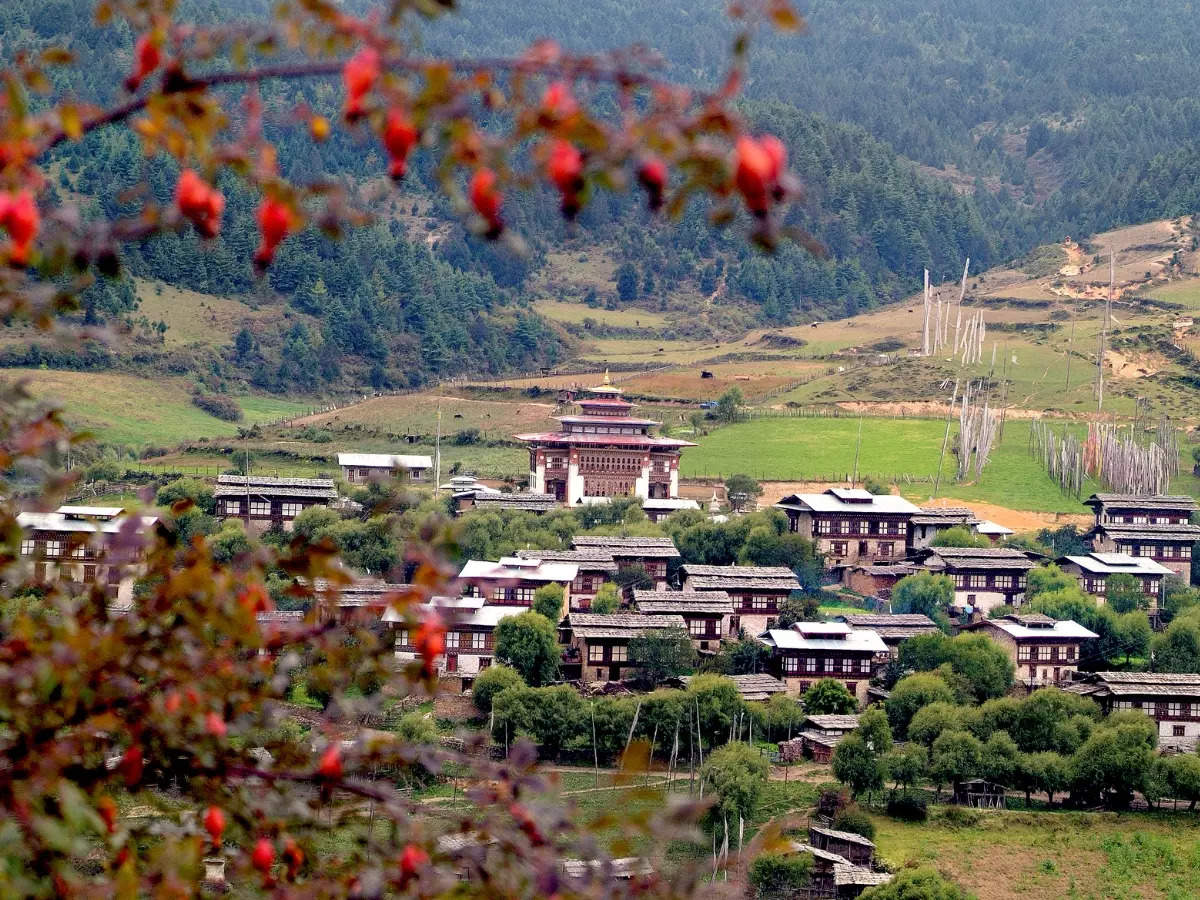
8 hill stations to visit in North India to escape Delhi's heatwave!
More from travel news.

Is Bhutan visa-free for Indians?
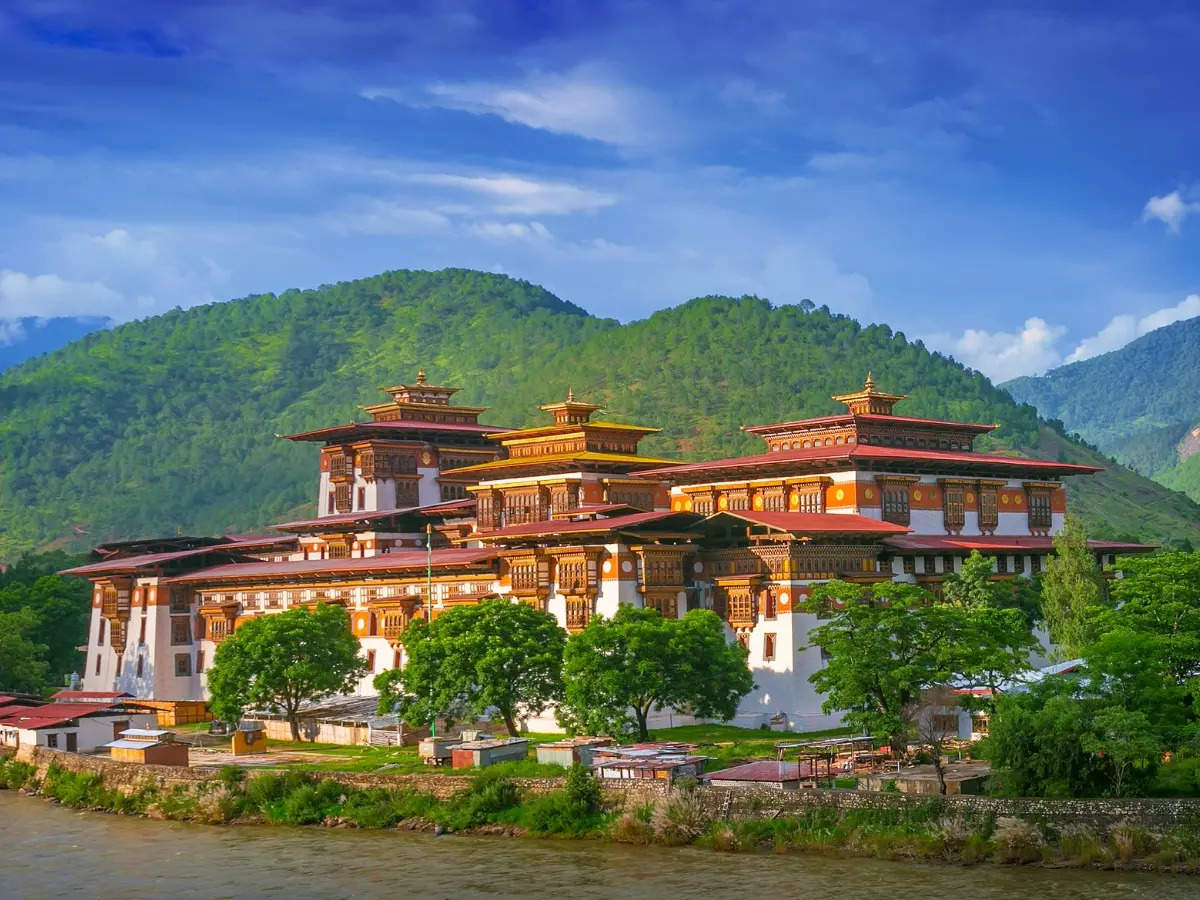
Do we need an entry permit to visit Bhutan?
Comments (0).

Refrain from posting comments that are obscene, defamatory or inflammatory, and do not indulge in personal attacks, name calling or inciting hatred against any community. Help us delete comments that do not follow these guidelines by marking them offensive . Let's work together to keep the conversation civil.
Comments ( ) Sort: Newest UpVoted Oldest Discussed Down Voted closecomments

SIGN IN WITH
Or post without registration.

Visual Stories
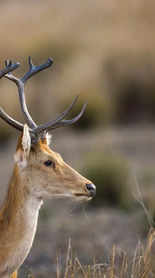
Popular Galleries
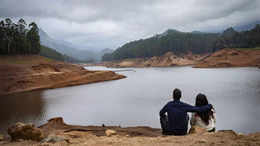
5 hill stations to visit near Bengaluru under 300 km

Prettiest places in Himachal Pradesh to explore this summer TRAVEL TRENDS , HIMACHAL PRADESH

Exploring India's 8 oldest heritage sites TRAVEL TRENDS , INDIA
Trending stories.
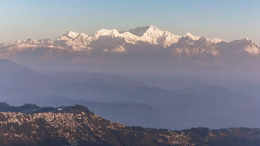
- Darjeeling’s Tiger Hill: A sunrise to remember

- Japan: The incredibly beautiful Hitachi Seaside Park is perfect in May

Going solo in India? 6 tips that’ll will make your trip memorable

Bastar region, the enchanting tribal heartland of Chhattisgarh

10 national parks to explore in Madhya Pradesh
- 1 Bhutan removes mandatory travel insurance requirement for tourists
- 2 Venice implements day-trip entry fee to tackle overtourism; when it is starting and how much
- 3 1800-year-old Alexander the Great’s portrait unearthed in Denmark
- 4 Chernobyl Exclusion Zone: A surprising haven for diverse wildlife
- 5 Bali urges foreign tourists to get dengue fever vaccines amid increasing cases

THE DEFINITIVE GUIDE TO DESTINATIONS, ITINERARIES, THINGS TO DO, RESTAURANTS, NIGHTLIFE and LOTS MORE!
FOLLOW US ON
Places to visit.
- Places to visit in Bangalore
- Places to visit in Mumbai
- Places to visit in Delhi
- Places to visit in Goa
- Hotels in Goa
- Hotels in Jaipur
- Hotels in Shimla
- Hotels in Mumbai
Things To do
- Things to do in Goa
- Things to do in Mumbai
- Things to do in Bangalore
- Things to do in Delhi
Travel Inspiration
- Visa on arrival for Indians
- Honeymoon Places in india
- Hill Stations in India
- Weekend getaways in Mumbai
- Weather in Delhi
- Weather in Chennai
- Weather in Bangalore
- Weather in Mumbai
Best Beaches
- Goa Beaches
- Mumbai Beaches
- Pondicherry Beaches
- Kerala Beaches
- Restaurants in Bangalore
- Restaurants in Chennai
- Restaurants in Pune
- Restaurants in Jaipur
- Hill Station near Delhi
- Winter trip to Ladakh
- Places to visit in Kerala
- Winter Honeymoon Destinations
- UK visa guide for Indians
- Winter Trip to Manali
- Vaishno Devi Yatra
- Special Train Ticket Booking
- HP inter-state Bus
- Honeymoon Destinations India
Latest News
- Discovering Kupwara: Kashmir's hidden gem waiting to be explored!
Congratulations!
You have been successfully added to the mailing list of Times of India Travel. To complete the subscription process, kindly open your inbox and click on the confirmation link which has been emailed to you.
Share with friends
Thank You for sharing! Your friend will receive the article link on email mentioned.
- (For more than one recipient, type addresses separated by commas)
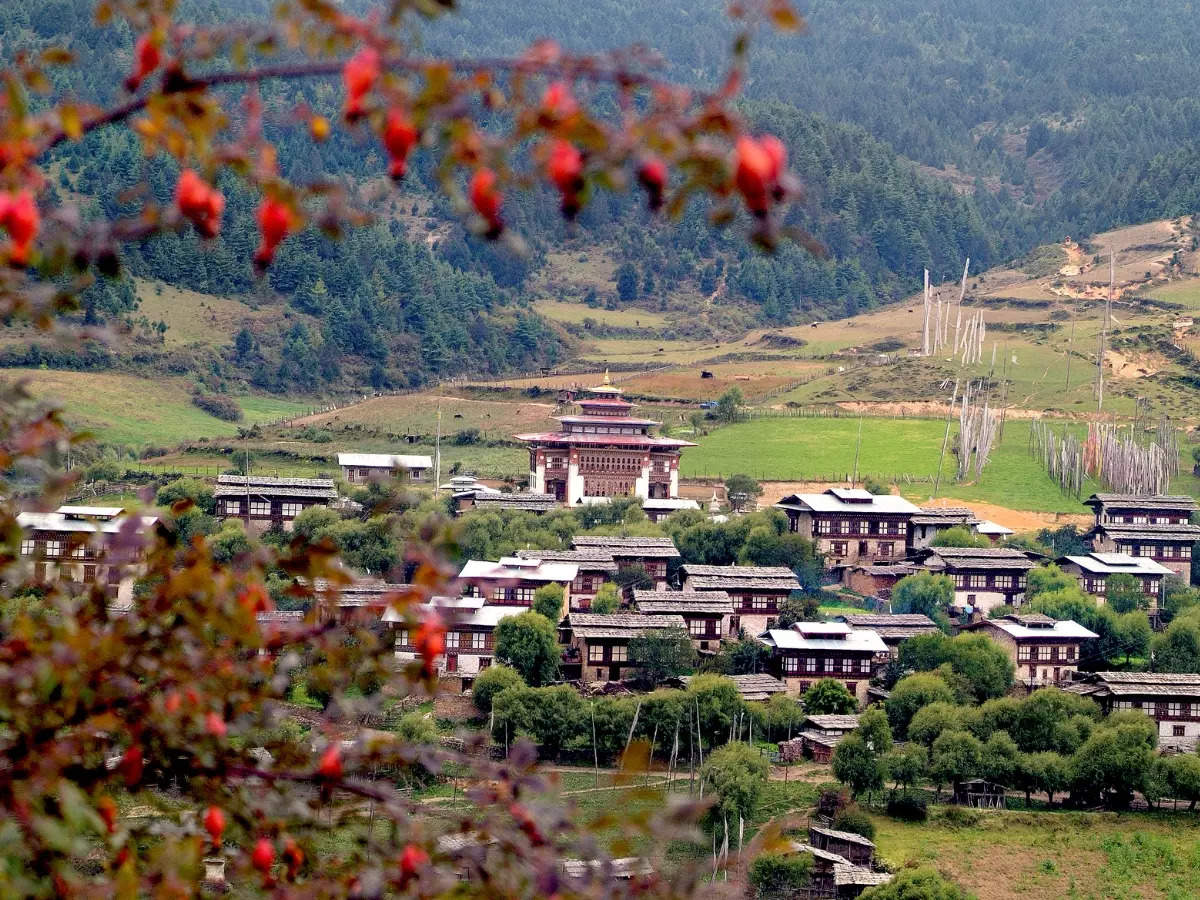
Bhutan lifts mandatory travel insurance for tourists, streamlining visa processing. Indian passport holders can visit visa-free, needing an entry permit from Phuentsholing's Immigration Office, extend...

Call: +91 7384718607
Logging in will help you easily save and manage your your itineraries and bookings.
Dont have an Account? REGISTER here
Signing up will help you easily save and manage your itineraries and bookings
Already have an Account? LOGIN here
Forgot Password
Enter your email ID. We will email instructions on how to reset your password.
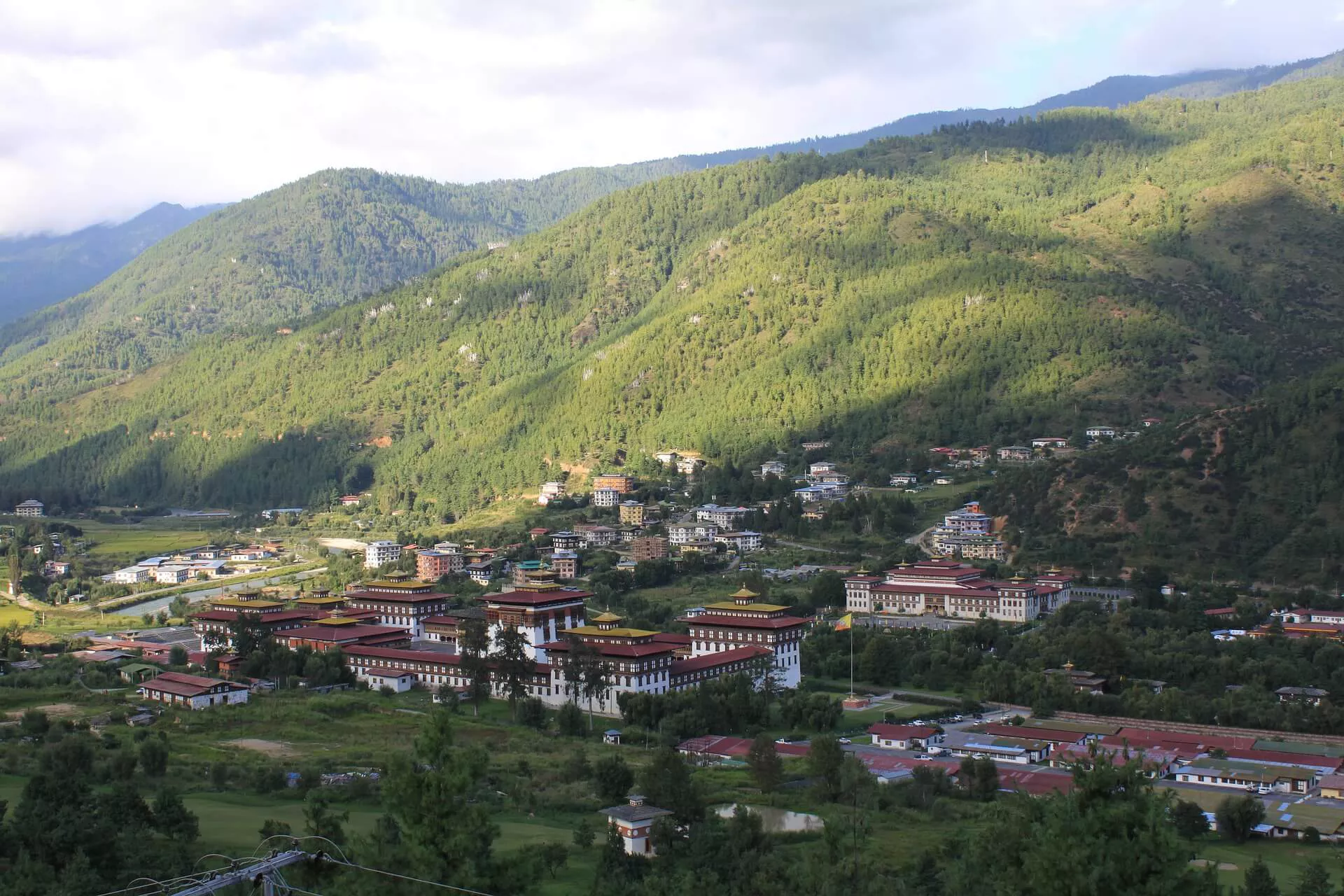
Bhutan Travel Guidelines For Indian Nationals
Share using:
http://www.tourgenie.com/travel-diaries/travel-blogs/bhutan-travel-guidelines-2022-for-indian-nationals
- Comment
- Share
Bhutan opened its doors post COVID with a promise of a better experience for its visitors from around the globe. Better infrastructure and improved services are some of the perks that welcome you this year. Yes, visiting Bhutan isn’t as affordable as before, but it’s totally worth it as it supports Bhutan’s sustainability efforts.
What has changed, what is mandatory, what do you need to carry- read on for all the details.
INTRODUCTION OF SUSTAINABLE DEVELOPMENT FEE
Bhutan is levying a daily sustainable development fee (SDF) on visitors to support Bhutan’s development. It is mandatory for Indians to pay 1,200 ngultrums, or the equivalent amount in Indian rupees, per person, per night. Children aged 6-12 years will be given a 50% concessionary discount on their SDF. Those aged 5 or younger are exempt.
Update (June 2023): According to the new rules, Bhutan has lowered the SDF for visitors paying in dollars. Tourists paying the daily fees for four days will be allowed to stay an extra 4 days. Those paying SDF for 12 days can stay for a full month. This will stay in effect till 2024.
Day visitors to the Bhutanese towns bordering India are also exempt from paying the SDF until they reach a point designated by the Bhutanese government.
MANDATORY GUIDES
It is now mandatory for Indians to be accompanied by a guide for journeys beyond Thimphu and Paro. Guides are thus also mandatory for visitors who enter Bhutan via land borders and plan to travel beyond the border towns. All treks must also be undertaken with an accredited tour operator or guide.
ENTRY PERMITS BY ROAD AND AIR
ROAD: Indians coming to Bhutan by road are required to obtain an 'Entry Permit' on the basis of valid travel documents from the Immigration Office of Royal Government of Bhutan at Phuentsholing, located on the Indo-Bhutan border opposite Jaigaon, West Bengal.
Note: Daily fee of 4500/- levied under "green tax" needs to be paid if driving your own vehicle.
AIR: Indians coming by air must possess valid travel documents and get an Entry Permit at the Paro International Airport.
Note: The 'entry permit' allows an Indian tourist to visit Thimphu and Paro only. However, any tourist going beyond Thimphu and Paro needs to acquire a 'special area permit' from the RGoB Immigration Office at Thimphu on any working day (Monday to Friday).
DOCUMENTS REQUIRED FOR PERMIT
1) Visitors from India require a passport or voter ID card. Children under 18 years of age require a birth certificate or passport and must be accompanied by a legal guardian.
2) Passport-size photograph.
3) Travel insurance* valid for the whole duration of the trip.
*There is an option to purchase domestic travel insurance from Bhutanese insurance providers at the port of entry during arrivals.
No visa is required to visit Bhutan for Indian nationals.
Fixed Departure Tours (Nov and Dec 2023)
25th Nov - 1st Dec
09th Dec - 15th Dec
23rd Dec - 29th Dec
Your details are safe with us
- Ujjaini R Das December 24, 2022
I would like to know if a guide is required for 2 people?? I read somewhere that Indian nationals can travel in Bhutan without guide. If the group is more is more than 4 then definitely guide is required.
- Reply 0 Like
- TourGenie February 21, 2023
Hi Ujjaini, a guide is mandatory for anyone visiting Bhutan, even if it's one person.
- sheeldarshi February 28, 2023
Hi, I am planning to visit Bhutan in April from Hyderabad via Jaigaon,India route. However, the permit office in Phuntsholing is closed on local holidays. So I am not sure where to get the list of local holidays( I can only find public holidays listed). Can you help to confirm the dates in April which have public holidays?
- Reply 1 Like
- Pradeep Desai March 07, 2023
We r a senior couple from Pune, India. We want to visit Bhutan in our own car. April end this year. Please guide us.
- Nedup June 05, 2023
You will need to pay a daily fee of Rs. 4,500 for your car as "Green Tax" plus the daily fee of Rs1,200 per person
- Janina Dsouza November 11, 2023
I am 77 years I would like to visit Bhutan.
Trending Blogs

General Read More
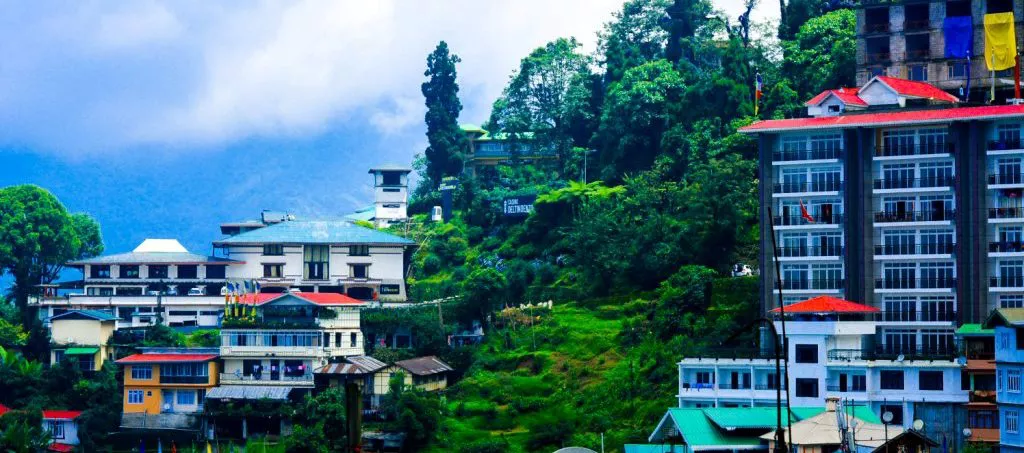
Leisure Read More
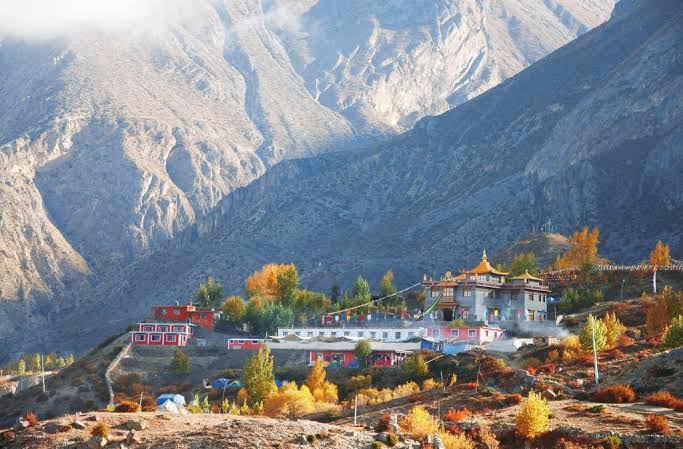
Adventure Rush Read More
Latest blogs.
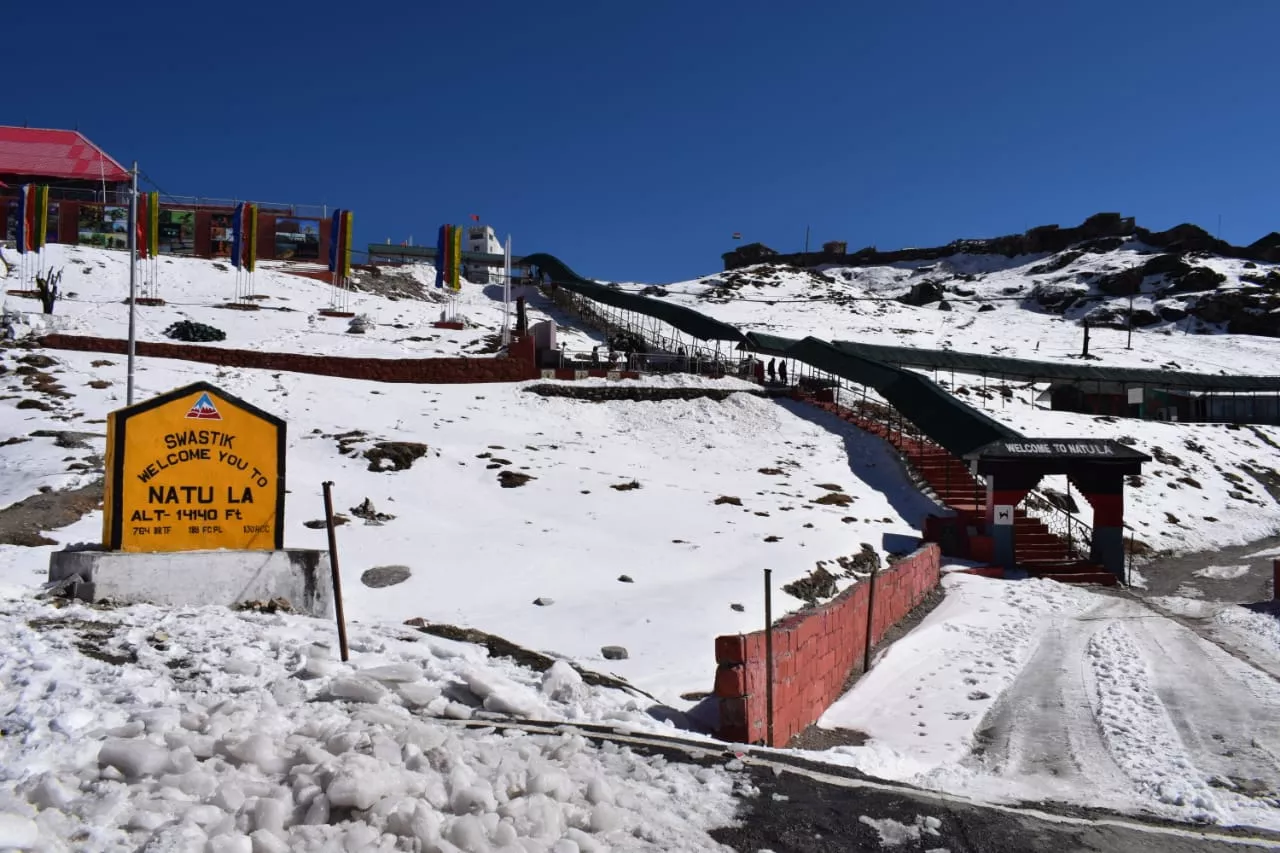
History Read More
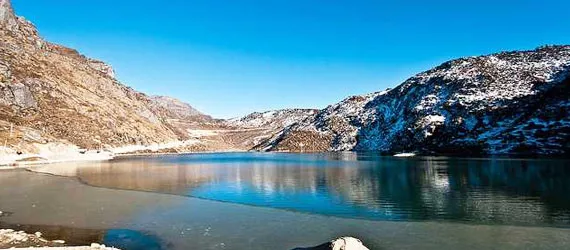
A call to all travel junkies
Share your amazing travel stories & inspire someone today, become a tourgenie contributor, write for our blog, want to explore more activities.
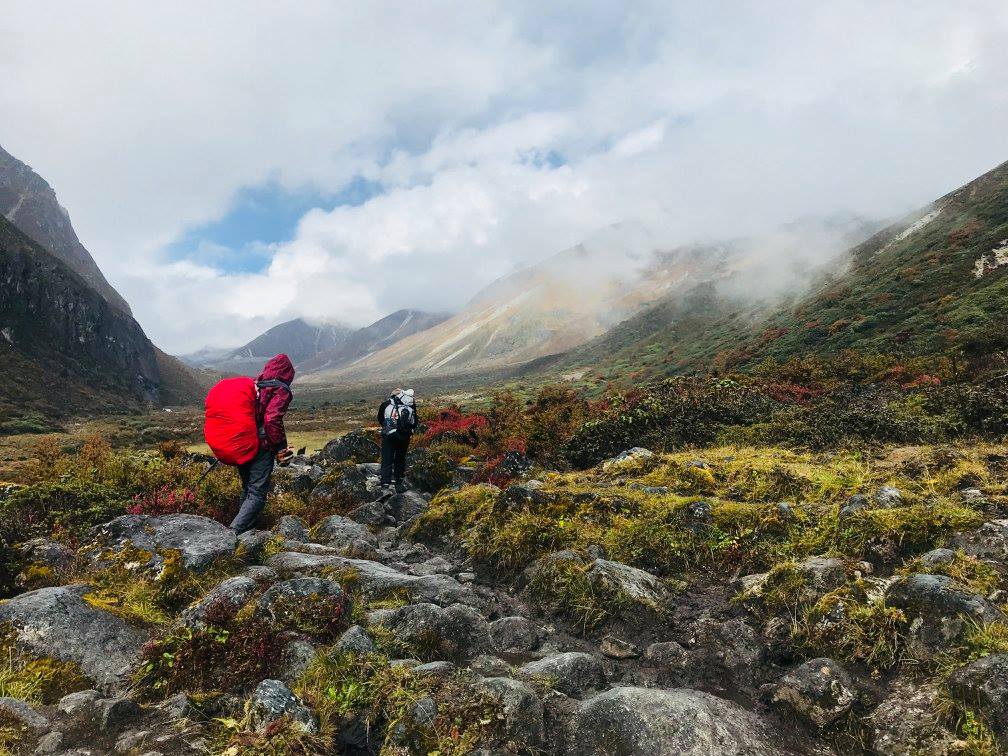
Trek to Goecha La
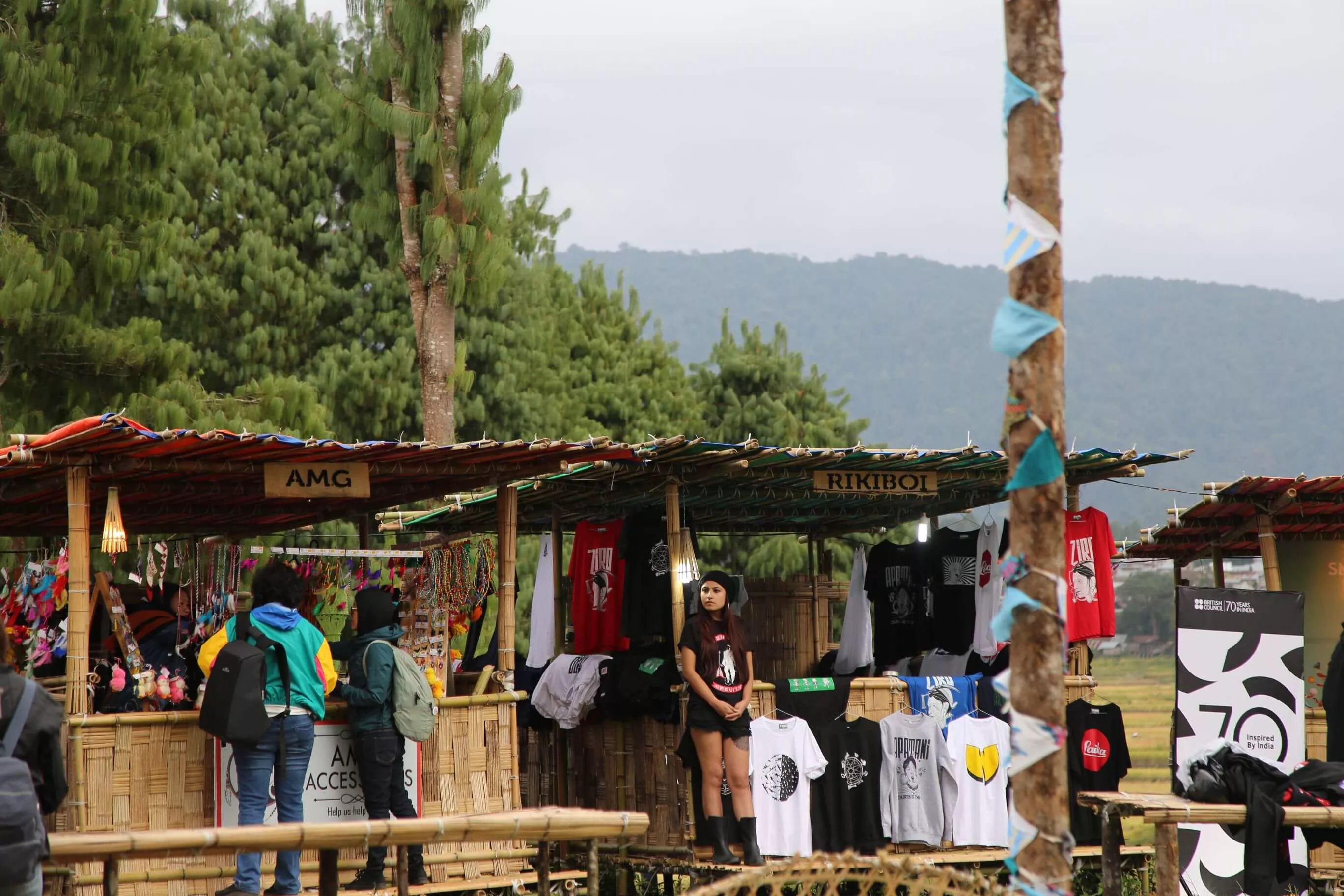
Ziro Music Festival
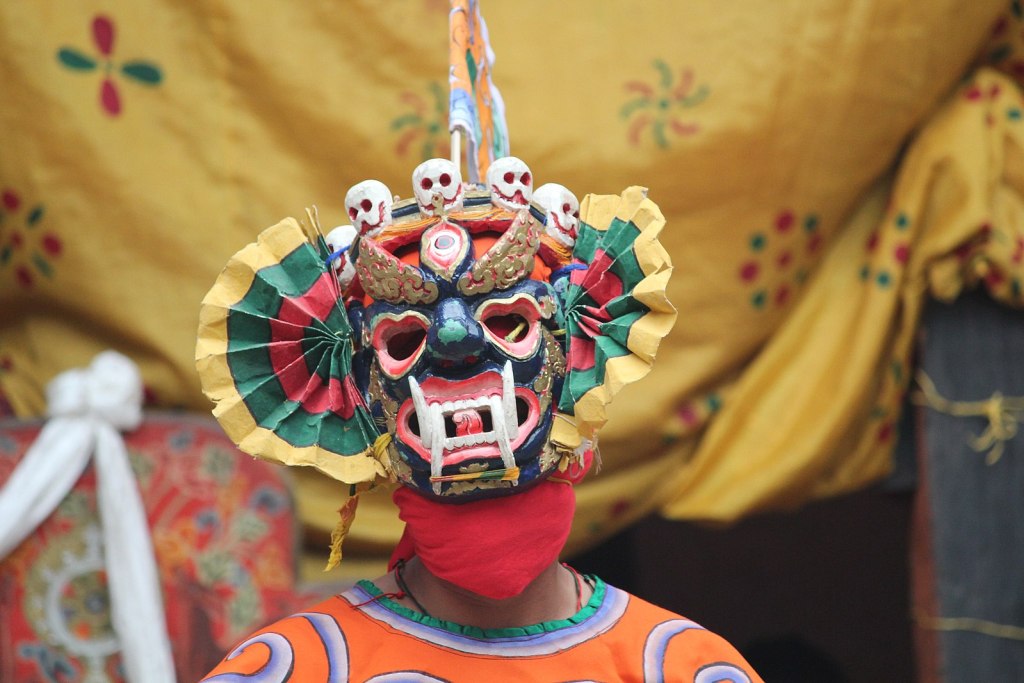
Lhuentshe Tshechu Festival Tour
- ABOUT TOURGENIE
- BLOG FOR US
- ENTRY & EXIT POINTS
- TERMS & CONDITIONS
- Arunachal Pradesh
- TRAVEL AGENT
Near Co-Operative, Middle Sichey Gangtok, East Sikkim, India, 737101
+91 7384718607

SNP holiday lets chaos is scaring off tourists, says Airbnb
- Global firm launches devastating attack on ‘shambolic’ short-term lets policy
Airbnb has launched a damning attack on the SNP ’s ‘flawed’ short-term lets policy, claiming it is driving tourists away from Scotland.
The $100billion global accommodation firm says tourists are shunning Scotland because of the Scottish Government’s holiday rental red tape shambles.
Government rules require anyone who rents out rooms or their home on a short-term basis to apply for a licence – costing up to £5,800 – from local councils.
Airbnb says the regulations are driving visitors away, particularly to towns in the north of England, and robbing Scots homeowners of much-needed cash.
It also argues the licensing scheme has failed to deliver the promised benefits for locals.
It is thought Airbnb will attempt to persuade the Scottish Government to review and change the rules.
The latest scathing assessment of the SNP scheme comes after The Mail on Sunday revealed the new rules had left Edinburgh’s famous festivals facing an accommodation crisis with a 90 per cent reduction in rental spots in the city.
The crackdown on short-term lets was meant to increase availability and affordability of properties for long-term residential letting.
But, according to Airbnb, rents have actually increased.
In a report entitled Six Months On: An update on the impact of Scotland’s short-term let rules, the firm concluded: ‘The implementation of short-term rental rules in Scotland is harming its tourism industry and limiting economic opportunities for local families.
‘Despite the measures, they have not delivered positive impacts on housing and rental prices, which have reached their highest annual rate in nearly a decade.’
Amanda Cupples, Airbnb general manager of Northern Europe, added: ‘Data shows Scotland’s short-term rental rules are not translating into benefits for local families.
Since the scheme has been in place, hotel and rental prices have increased, tourism is expected to suffer, and families have lost a vital source of income.
‘Airbnb has worked with governments across the world to balance the benefits of short-term rentals with local housing concerns, and we hope to work with Scotland on policies that benefit everyone.’
The attack by Airbnb follows warnings over the future of the Edinburgh Festival Fringe, with a number of high-profile figures claiming accommodation in the city is now so expensive acts can no longer afford to perform there.
Former BBC presenter Gail Porter said she had been ‘priced out’ of putting on a show in her home town, while comedian Jason Manford said Edinburgh prices were an ‘absolute joke’.
Meanwhile, demand for sell-out events such as Taylor Swift’s concerts in June has also helped drive prices up to stratospheric levels.
The rules requiring councils to run a short-term let licensing scheme came into force last October.
Anyone renting out anything from a single room in a shared flat to a whole castle, as well as rooms in B&Bs and guesthouses – must apply and pay for a licence.
The rules were intended to curb the number of short-terms lets, particularly in Edinburgh where some residents complained they were being swamped by visitors.
However, tourism bodies and accommodation providers warned the rules were draconian, costly and created a huge burden of red tape, harming businesses already struggling with inflation pressures and the legacy of the pandemic.
Tory MSP Murdo Fraser said: ‘This damning report shows the damaging reality of the SNP’s flawed short-term lets policy.
‘Tourists are turning their backs on Scotland and small business owners are being hammered.’
Airbnb was founded in 2008 in the US and is now the world’s best known online site for short-term lets.
It advertises around five million properties in 100,000 towns and cities around the globe. The firm believes the new rules in Scotland are having a negative effect.
Its report stated: ‘The disruption to supply will limit accommodation options for guests, restrict earning opportunities for families and hurt small businesses that rely on visitors to Scotland.’
Airbnb also pointed out the introduction of the licensing regime has not led to long-term rentals for residents becoming cheaper.
It said: ‘Long-term rental prices surged 6.8 per cent in the 12 months to January 2024.
This increase marks the highest annual rate recorded in over a decade, indicating the new rules on short-term lets have not immediately resulted in improved rental affordability.’
Airbnb claimed some visitors are heading elsewhere, stating: ‘With fewer options available, travellers are now increasingly turning their attention to the north of England.
‘Cities such as Liverpool and Newcastle have experienced a surge in searches, suggesting they are becoming attractive alternatives for travellers.’
Catherine Sutherland, an Airbnb host from Edinburgh, said providers such as her were losing out.
She added: ‘The regulations are hurting tourism. People are struggling to find affordable accommodation and are effectively blocked from visiting Scotland.’
The Scottish Government has defended the licensing scheme. It said: ‘The number of overseas visitors to Scotland has recovered from the pandemic at a faster rate than the rest of Britain.
‘The introduction of licensing provides assurance to guests on safety and quality.’

Tourism groups worry as B.C.'s short-term rental rules change
Communities in the tourism-heavy okanagan are among those facing new limits on airbnb, vrbo rentals.

Social Sharing
Ralph and Tina Gerlitsch say they've had to rethink their retirement plans due to B.C.'s new short-term rental regulations.
The couple own a bungalow on a leafy residential street in the Glenmore neighbourhood of Kelowna, B.C., and, for the last couple of years, they've also been running a seasonal Airbnb in a downtown Kelowna highrise.
They would rent the apartment to tourists in the summer and students during the academic year.
"We ran [it] for two years and it was wonderful," Ralph Gerlitsch said.
However, starting May 1, new provincial rules will make such enterprises illegal.

B.C. announces new rules around short-term rentals to take effect May 1
In many B.C. communities , including Kelowna, short-term rentals will only be allowed in an operator's principal residence, and one secondary suite or carriage house on the same property.
The Gerlitsches say their Airbnb is one of those that will have to shut down.
"This was our Hail Mary for retirement. It really hurts when somebody at a desk, in government, can tell me what I can do with my property," Ralph said.
"Don't ask me if I'm angry, but I certainly am."
While the provincial government hopes the rule changes will free up much-needed housing for long-term residents, critics say they are also creating uncertainty for the broader tourism industry with some worrying the Okanagan will become a destination reserved for the wealthy, and businesses will suffer in the process.
Uncertainty for tourists and tourism
Known for its lakes, beaches and wineries, the Okanagan Valley attracts crowds each year, with more than two million overnight trips to the Kelowna area alone in 2023, according to Tourism Kelowna statistics.
The same agency says the tourism industry has an annual economic impact of $2.4 billion in the Central Okanagan.

That means many businesses have a financial stake in tourists finding a place to stay — and some feel as if the short-term rental rules are limiting affordable accommodation options.
"Our hands are really tied unless they suddenly open up a bunch of brand new hotels at a decent price," said Krystina Rossworm, whose company offers private tours of wineries and adventure spots in the Lake Country region.
"I am afraid of what's going to happen and I feel very powerless against this type of decision."
Tourists themselves have been left uncertain about what the changes mean for them.

Jackie Roberts of Lacombe, Alta., booked accommodation in Kelowna this summer through Airbnb.
Now she's unsure whether the booking will be able to go ahead.
When she went to look for alternative places she ran into issues with both availability and price.
"I know it is going to deter people from going if, one, there is no vacancy and, two, we are paying double the price or more to find a place that is available," Roberts said.
Plenty of available rooms: hotel director
An executive in the local hotel industry disagrees that tourist accommodation will be a problem under the new regulations.
Rudolf Heider, director of hospitality for Argus Properties, which has four hotels in the Kelowna area, says hotels have plenty of space to cope with demand.
Heider said in 2023 hotel occupancy in Kelowna was 59 per cent, lower than the 69 per cent occupancy provincewide.

He believes the regulation can actually help the tourism industry by helping to open up housing for staff to live in.
"We have, over the last couple of years, seen quite a few managers … leave Kelowna and go to other places [like] Kamloops, Trail, etc., because housing is just not affordable any more, or not available," he said.
Asked if the price of hotel rooms is going to increase because hotels have less competition, Heider said he doesn't think his hotels compete that much with Airbnb.
"I don't feel it will be a huge increase in the pricing," Heider said.
"I don't think it will bring that much demand that you can really push pricing and I think we have room even during those [peak] months to really take the additional demand."
More hotels being built
Data from Tourism Kelowna shows the area's hotels are typically between 70 and 90 per cent full in the summer.
The society's CEO, Lisanne Ballantyne, said the Kelowna area currently has about 4,500 room nights in conventional accommodation and, during peak seasons, around 2,000 active short-term rental listings.
That means short-term rentals have made up about 30 per cent of Kelowna's tourist accommodation during peak seasons.
Ballantyne said there are more hotels in the works for the city.

"My office probably gets at least three requests every month from developers that are looking for information to help them develop hotel properties. We have a number of cranes in the sky and we also have a number of hotels waiting to come online as well," she said.
As for Ralph and Tina Gerlitsch, they'll be selling their home and moving into what used to be their short-term rental apartment.
Ralph expects they'll soon be handing over the keys to his house to a new owner.
"There will be tears. For sure, there will be tears," he said.
- 19,000 homes are permanently listed as short-term rentals, B.C. government says
- B.C. is changing its short-term rental rules. Some owners think that's a mistake
- Outspoken Vancouver Airbnb host in court over lack of business licence
- Some strata hotels, motels to be exempt from B.C.'s short-term legislation
- Parksville, B.C., residents worry over short-term rental exemptions
- Video Tourist town of Tofino wants to restrict short-term rentals
- Province rejects Prince George's request to keep short-term rentals on secondary properties
ABOUT THE AUTHOR

Megan Turcato is an associate producer with CBC Kelowna. She has more than a decade of experience covering news and current affairs in B.C.'s Southern Interior.
Related Stories
- Top stories from British Columbia
'My misery, your paradise': The problem with tourism in the Canary Islands
Protesters have taken increasingly extreme measures, with one group going on an "indefinite" hunger strike.

News reporter @jos_franks
Saturday 27 April 2024 08:44, UK
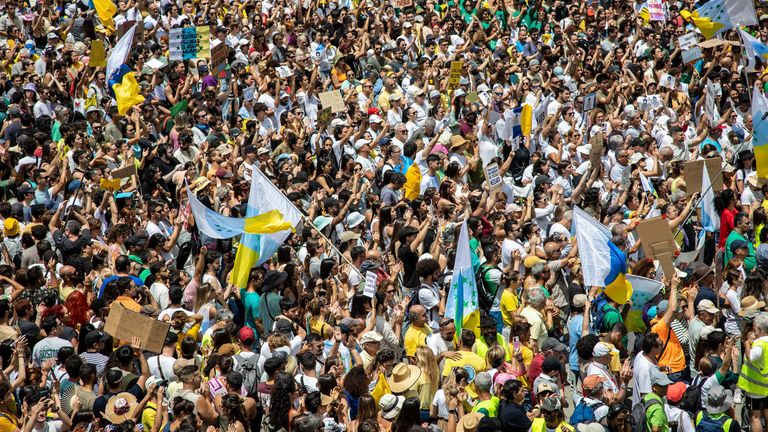
A wave of demonstrations have swept the Canary Islands as locals protested against a tourism model they say has plundered the environment, priced them out of housing and forced them into precarious work.
The seven main Canary Islands are home to 2.2 million people - and welcomed almost 14 million international visitors in 2023, up 13% from the previous year.
The protests were not aimed at individual tourists, activists say, but at the governments that have created a system that skews so much in favour of investors at the expense of local communities.
The tourism industry accounts for 35% of gross domestic product (GDP) in the Canary Islands and local residents who spoke to Sky News agree the islands can't survive without tourism.
But they are also questioning whether local communities and the environment can survive if things stay the way they are.
What's the problem? Tourism is a 'cash cow' - but not for locals
If you're looking for what's behind the wave of protests, you need to look back decades, Sharon Backhouse tells Sky News.
Along with her Canarian husband, she owns GeoTenerife, which runs science field trips and training camps in the Canary Islands and conducts research into sustainable tourism.
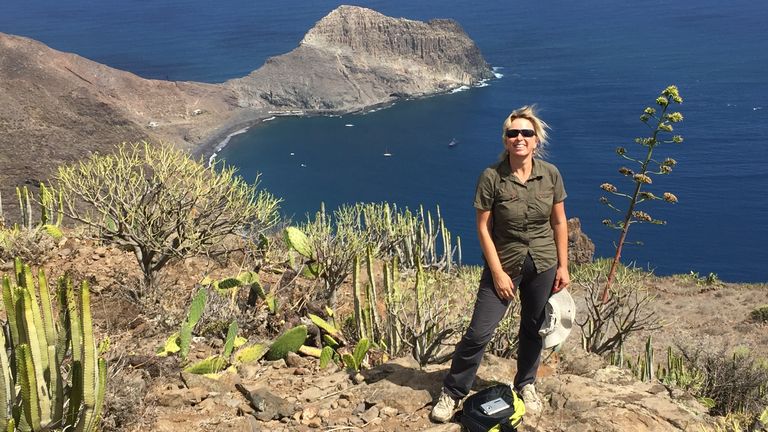
The tourism model in the Canary Islands hasn't been updated since before the tourism boom of the 1980s, when the islands were "trying desperately" to attract investment, she explains.
The answer back then was a model that was "incredibly generous" to investors, who only pay 4% tax and can send the profits earned in the Canaries back to the firm's home country, Ms Backhouse explains.
But the model hasn't changed.
That's created a situation where "more and more of these giant, all inclusive resort hotels" are being built, and the proceeds of this "incredible cash cow" aren't shared equitably with the local population, she says.
"It is absurd to have a system where so much money is in the hands of a very few extremely powerful groups, and is then funnelled away from the Canary Islands," she says.
"We're seeing really low salaries, zero-hour contracts and awful working conditions in some of these hotels."
Ms Backhouse was at the 20 April protest in Tenerife and says she has "never seen anything like it" in terms of Canarians being united for a single cause.
'My misery, your paradise'
Earlier this year there was a spate of graffiti in Tenerife.
Andy Ward, director of Tenerife Estate Agents, tells Sky News the media coverage of a smattering of "tourists go home" graffiti has been "100x greater than the on-the-ground reality", where there is little visible animosity.
But there was one spray-painted message that sums up the gulf between Canary Islands residents and the tourists who flock there: "My misery, your paradise".
More than a third of the population of the Canary Islands - nearly 800,000 people - are at risk of poverty or social exclusion, according to a recent report from the environmental group Ecologists in Action.
The average wage for restaurant staff and cleaners is between €1,050 and €1,300 a month, Mr Ward says, while the cost of renting an apartment can be almost as much.
'Shanty towns' in the shadow of luxury
One of the main issues is the dearth of affordable or social housing, Mr Ward says.
"The governments here have completely neglected this need, instead selling land for more hotels and selling land for luxury villas and high-end apartments, which locals are unable to afford."
What has caused anger is property managers renting out properties to tourists that are "completely inappropriate and inadequate", such as small apartments in residential buildings.
Please use Chrome browser for a more accessible video player
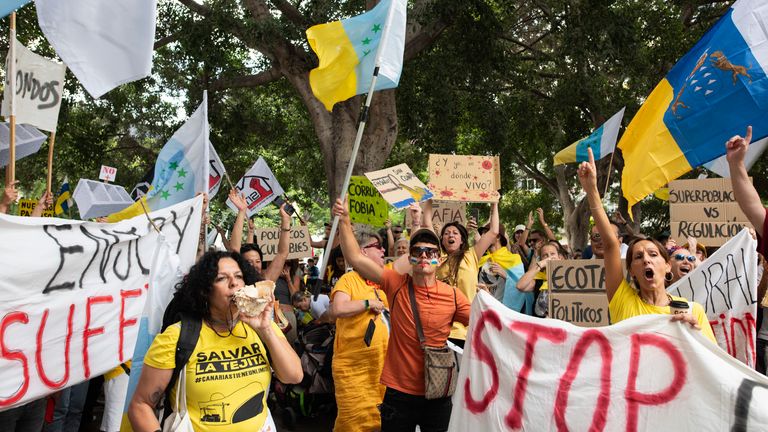
The regulations on short-term lets "are a complete mess and a mish-mash", he says. Landlords aren’t incentivised to let their properties long-term because they must sign up to long leases, and if tenants default on the rent it can take 18 months to evict them.
His views are echoed by Kris Jones, a British citizen who was born in Tenerife, taking over the bar his parents owned in Playa de la Americas, the Drunk’n Duck.
Many hotel employees are forced to live in the multiple motorhome sites that have popped up around the south of the island because they can’t afford anything else, he says.
"Shanty towns" is what Ms Backhouse calls them, built in the shadow of "uber luxury hotels".
Mr Jones questions why planning permission has been granted to hotels without ensuring their employees will be able to live nearby.
He says the idea the island's population hates foreign visitors is "utter garbage".
He stresses that the protests were against the government - not tourists.
"It's nothing to do with the behaviour of British tourists, and isn't even part of the agenda at all," he tells Sky News.
Hunger strike to stop hotels
Protesters say they are having to take increasingly drastic actions to have their voices heard.
Subsequently six members of Canarias Se Agota - which translates to the Canary Islands Are Exhausted - have been on hunger strike since 11 April.
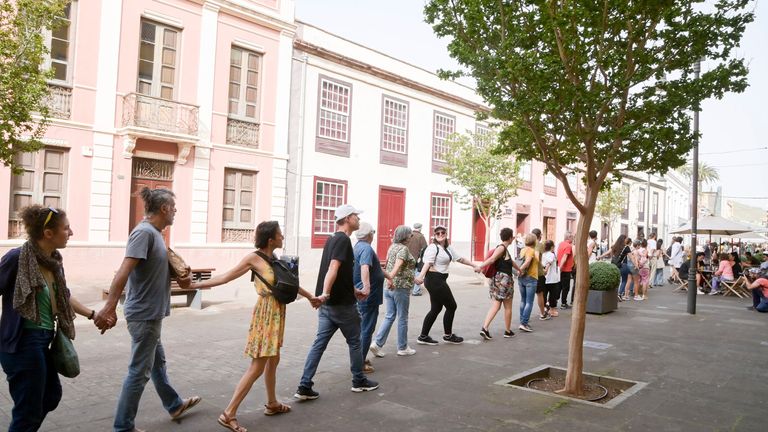
As well as demanding a halt to new tourism developments and a limit to the number of visitors, the campaigners want to stop the development of two luxury resorts in Tenerife.
Both developments faced legal hurdles on environmental grounds that had paused construction, but stop work orders were lifted earlier this year.
Campaigners maintain the developments breach environmental laws - claims the developers deny - and have committed to continuing the hunger strike until the government intervenes, despite some strikers needing hospital treatment.
The hunger strikers, who have not been named, were among fellow protesters on the streets of Tenerife on 20 April.
A spokesperson for the campaign said: "If anything happens to any of our comrades... you (Fernando Clavijo - president of the Canary Islands) will have to face the fury of the people."
The strikers met with the Canary Islands president on 23 April, but their demands were rejected.
Representatives of the strikers said on 26 April the "medical condition of the six is deteriorating, but they are determined to continue" until their demands are met.
Be the first to get Breaking News
Install the Sky News app for free

Protesters are also demanding "access to respectable housing", an "eco-tax" and "immediate measures to put an end to the raw sewage discharges into the sea".
Salvar La Tejita, an environmental organisation which helped organise the mass protest, says: "It is vital to clarify that these protests are not against the tourists or tourism in general, but are against the political class, administrations, hotel chains, and constructors who are jointly responsible for the unsustainable circumstances which Tenerife is now in.
"This platform is not in any way responsible for the graffiti messages 'Tourists Go Home' which have been sprayed in and around many tourist resorts.
The environmental cost of tourism
The Canary Islands are a "biodiversity jewel in the Atlantic", Ms Backhouse says - but they haven't been fully protected or valued.
Politicians in the past have said the development of the controversial resorts can't be stopped "just because of a weed", she says.
"These aren't just weeds. What they're actually doing is interfering with an ecosystem which will have difficulty surviving if you plonk a resort right in the middle of it."
The building of these resorts has an environmental costs as "beautiful landscapes are cemented over", Ms Backhouse says - and the cost only mounts once they open.
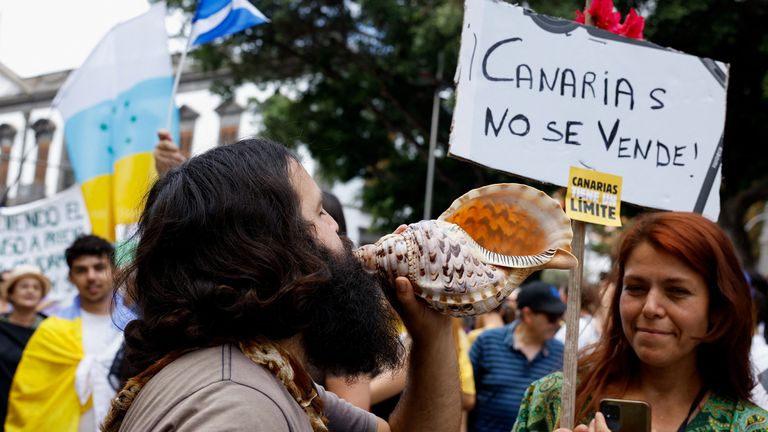
"The problem with these resorts is that we just don't have enough resources in terms of water, what happens to all the rubbish, how is it all recycled.
"Locals are feeling disenfranchised from their spaces because it all becomes tourist territory.
"Towns and villages that locals grew up in or would go on holiday in suddenly are completely unrecognisable."
What solutions are on the table?
One of the proposals is a tourist tax which would be invested in protecting the environment.
Ms Backhouse says the hotel industry is against it and the government is nervous about it - but GeoTenerife's research indicates it wouldn't put tourists off.
"I think the reality is very few people will cancel their holiday because they have to pay a little bit of money that goes towards protecting the landscapes they're coming to see."
Hoteliers have proposed instead putting up IGIC, which is similar to VAT, but Ms Backhouse says that isn't welcomed by campaigners "because again, that just puts the onus on the locals to prop up the system".
A tourist tax is one part of the answer to protect the environment, but it doesn't answer the question of job insecurity and unaffordable housing.
Ms Backhouse says it is encouraging to see solutions proposed, but "it's going to take something far more wide-ranging to put this train on a more sustainable track".
Impending crackdown on holiday homes
A draft law is expected to be passed this year which would ban newly built properties from becoming short-term rentals and toughen up the rules for existing properties.
It comes as official figures show the number of rental beds on the island reached 220,409 in March this year - an increase of more than 40,000 from the same point in 2023.

Canaries regional tourism chief Jessica de Leon told the Reuters news agency that enforcement support for the islands' 35 inspectors is key to the success of the new rules.
"We are going to empower [the police] so that they can act when fraudulent behaviour is detected in homes," she said, adding that the plan could involve 1,300 people, which would include all of the islands' police forces.
"The first step is to contain the growth, the second is to clean up [existing listings]," said Canaries director of tourism Miguel Rodríguez.
An example of the crackdowns to come occurred on 16 April, when police raided a property in Tenerife after its owner was reported for listing the building's rooftop as a campsite on Airbnb, offering renters tents for €12 (£10) a night.
Read more: Tourist dies after falling into sea in Tenerife Why are university students protesting in the US?
The plans have not proved popular with landlords, who would be forced to comply with the new rules within five years.
"Everything that the government is trying to impose is problematic," says a spokesperson for Ascav, the Canary Islands Vacation Rental Association, adding it is "the most restrictive" legislation of its kind in Europe.
They believe around 95% of the existing holiday homes that abide by current laws will not be able to meet the new criteria, which includes getting consent from local authorities to open, meeting higher energy classification thresholds, having a minimum surface area and more in a long list of "impossible compliance".
"The consequences will be immediate," they warn. "If holiday homes are banned on the islands, visitors who demand this type of accommodation will choose other destinations, Canary Islanders will be even poorer, bars, restaurants, rent a cars, supermarkets, leisure activities, etc. will lose economic activity. Undoubtedly, we all lose."

Keep up with all the latest news from the UK and around the world by following Sky News
Ascav acknowledges "something is going wrong" for the island's economy, but argues it's not down to those providing holiday homes, nor the tourists Canarians "love".
"The message is for our governments, for their passivity, incompetence and lack of planning," they say.
"They are the ones that have allowed that the resources of tourism has not to been shared with the local population. Locals has been excluded because governments preferred permitting to exploit the territory and tourism to the maximum, without any return for the islands and their inhabitants.
"The solution is to listen to ourselves, to listen to our visitors, to listen and protect to the Canary islanders, to integrate, to plan, to be sustainable, to grow with, not at the expense of, to be responsible for the territory and the well-being of its people, to diversify, to ensure the quality of the destination.
"Our problems have to be resolved by politicians, but they lack will and predisposition, that's why we are fed up."
What have politicians said?
The islands' president said the day before the 20 April protests that he felt "proud" the region is a leading Spanish tourism spot, but acknowledged more controls are needed.
"We can't keep looking away. Otherwise, hotels will continue to open without any control," Fernando Clavijo told a news conference.
Two days after the protest, Mr Clavijo posted on X saying: "What happened last Saturday in the streets of Canarias leaves a message that we share. Canarias has to review its model, where we want to go.
"It had to be done during the pandemic, but it is a challenge that we assumed and on which we are already working with the councils, with the city councils and that we must face as a whole in society."
He has called a meeting of island presidents and Canary Island administrators on 30 April in the hope of finding a solution.
Related Topics
- Canary Islands

IMAGES
COMMENTS
A tourist shall engage a guide with relevant specialization based on the nature of the tour and shall be open to choose and change tour guide as provided in these Rules and Regulations. 25. A minimum of one guide shall be arranged for every ten tourists in a group or. 15 tourists if accompanied by a tour leader. 26.
1. Independent travel is finally possible, but a tour operator is still the way to go. Since reopening in 2022, Bhutan has scrapped its all-inclusive tour-package minimum, and initially raised the Sustainable Daily Fee (SDF) to US$200 before reducing it to US$100, valid now through September 2027.There is a 50% discount for kids ages six to 11, with no SDF for those under six.
At your point of entry into Bhutan, immigration authorities will stamp a visa into your passport upon payment of $40 U.S. or Nu.2500. You will also need to provide two passport photos. Tourist visas are usually granted for the scheduled travel period. More information, including a list of authorized tour operators in Bhutan, may be obtained ...
Bhutan Tourist Tariff New SDF informationAfter two years of tourism at a standstill due to the pandemic, our country finally opened its gate on 23rd September 2022. With the onset of the new tourism wave worldwide, our country is set on a different path.On 27th June 2022, the National Assembly
1. Bhutanese tour operators will apply for a visa on behalf of the tourist to Tourism Council of Bhutan (TCB). 2. Tourists will be required to obtain an online visa before arrival. 3. Visa fee of USD 40 will be applicable and visas will be issued for 1 month. 4. The following are mandatory for processing visa: a.
Bhutan Travel Restrictions For Tourists: Restricted Area. When you arrive in Bhutan, you will be given a 7-14 day stay permit that will only allow you to travel within the Thimphu, Paro, and Southern districts. Beyond these districts, the rest of Bhutan is categorized as restricted areas. So, if you want to explore Bhutan's hidden gems, Norbu ...
The Bhutan Tourist Corporation Limited (BTCL) is highly recommended for making travel bookings to Bhutan. This company is owned by members of the royal family and advertises itself as Bhutan's number one travel agency since 1991. The drivers, guides, and accommodations provided are excellent.
7.3.1. Any Driver involved in tourism activities must at all times, adhere to the Rules and Regulations prescribed by relevant authorities. 7.3.2. A Driver shall at all times comply with the Road Safety and Transport Authority Act and the Regulations outlined therein while driving, including traffic sign rules.
With the reopening of tourism in September 2022, foreign tourists can once again enter Bhutan overland through one of three border crossings with India. In reality, the crossing to Phuentsholing is the only one that sees much tourist traffic, mainly with adventurous travelers combining Bhutan with the sights of nearby Darjeeling or Assam.
Welcome to Bhutan. In a world that is always on the go, Bhutan provides sanctuary. Here, you can find earthly pleasures: archery and age-old crafts, dishes of home-made cheese and fearsomely hot chillies, breathtaking treks and restorative hot-stone baths. But there's another Bhutan, too - the one hinted at by the prayer flags strung across ...
Until 2022, tourists to Bhutan were charged a daily tourist fee of $250 ($200 in the low season) for every day spent in the country. This might sound expensive, but the fee covered food, accommodation, transport, guide fees and most of the other essentials tourists needed for a once-in-a-lifetime trip. Also included in the daily charge was a ...
Five things to know as Bhutan reopens to travellers in 2022. Covid protocol. While the Bhutan government recommends that visitors are vaccinated against COVID-19 to help curb the pandemic, there are no COVID-19 vaccination requirements for anyone to enter Bhutan. There is no quarantine period.
tourist to Tourism Council of Bhutan (TCB) b. Visa fee of USD 40 will be applicable. c. The following are mandatory for processing visa/e-permit: ... with the Tourism Rules and Regulation 2017 (TRR 2017) and Tourism Levy Act and 2020 until amended. DISCOUNTS ON SDF
The Tourism Council of Bhutan is pleased to announce the Tourism Policy of the Kingdom of Bhutan 2021. The policy envisions to promote Bhutan as a green, sustainable, inclusive, and a high-value tourism destination guided by the policy of 'High-value, Low volume' tourism to contribute to the overall socioeconomic development of the country.
The mandatory requirement of travel insurance for tourists visiting Bhutan was introduced during the COVID-19 pandemic to cover unforeseen emergencies including medical expenses relating to the pandemic. ... Those violating the rules will be dealt as per the Tourism Rules and Regulations 2022. For queries and clarification, please contact Ms ...
Reissued with updates to health information. Exercise normal precautions in Bhutan. Read the country information page for additional information on travel to Bhutan.. If you decide to travel to Bhutan: Enroll in the Smart Traveler Enrollment Program to receive Alerts and make it easier to locate you in an emergency.; Follow the Department of State on Facebook and Twitter.
Travel agents and tour operators will arrange your visit and apply for your visa. A daily rate covers most services in the package, including accommodation, meals, internal transportation (except flights), guides and cultural programs. You must travel in groups with authorized drivers when visiting Bhutan. Tourist facilities are very limited.
Bhutan will lower the nightly fees it charges tourists who stay more than four days, in an attempt to boost visitor numbers that are still a fraction of the level before the COVID-19 pandemic.
Tourism rules and regulations of Bhutan 2022. Guidelines. Guidelines for establishment of Homestay. Guidelines of Tented Accommodations. Procedure for Assessment and Registration of Tourist Standard Restaurants. Procedures for Assessment and Classification of Tourist Standard Hotels. Guidelines for Hotel Drawing. Checklist to become a Tour Guide.
Bhutan's Department of Tourism has announced a notable change by removing the compulsory travel insurance requirement for tourists. Initially introduced during the COVID-19 pandemic to cover ...
Bhutan, a bucket-list destination for many adventure travelers, closed its borders on March 22, 2020, due to the global pandemic. They have since reopened with a new tourism strategy, focusing on ...
Update (June 2023): According to the new rules, Bhutan has lowered the SDF for visitors paying in dollars. Tourists paying the daily fees for four days will be allowed to stay an extra 4 days. Those paying SDF for 12 days can stay for a full month. This will stay in effect till 2024.
In 2023, Bhutan cut the fee to $100 per day in a bid to boost tourist numbers. Bhutan's cautious approach to the tourism sector is reflected in its other sectors, including industries and ...
Imagine a place untouched by mass tourism, boasting breathtaking Himalayan landscapes, vibrant Buddhist culture, and a deep respect for nature. This isn't Shangri-La; it's Bhutan, and it's ...
We travel around Bhutan to find the best luxury accommodation in all the main tourist centres in the Himalayan kingdom. ... Bhutan's capital is not exactly a bustling metropolis. With a ...
The $100billion global accommodation firm says tourists are shunning Scotland because of the Scottish Government's holiday rental red tape shambles. ... Government rules require anyone who rents ...
Ralph and Tina Gerlitsch say they've had to rethink their retirement plans due to B.C.'s new short-term rental regulations. The couple own a bungalow on a leafy residential street in the Glenmore ...
The protests were not aimed at individual tourists, activists say, but at the governments that have created a system that skews so much in favour of investors at the expense of local communities ...